WHAT TO SEE IN SHARJAH
Cultural experiences, artistic wonders, and hidden treasures
in the most authentic heart of the Gulf
Sharjah, a city overlooking the turquoise waters of the Persian Gulf, is the capital of the emirate that shares its name and one of the most captivating destinations in the United Arab Emirates. Getting there is easy: Sharjah International Airport, hub of Air Arabia, is just a few minutes from the city center. Bathed in sunshine year-round, the best time to visit is in the second half of the year, when the weather becomes milder and more pleasant.
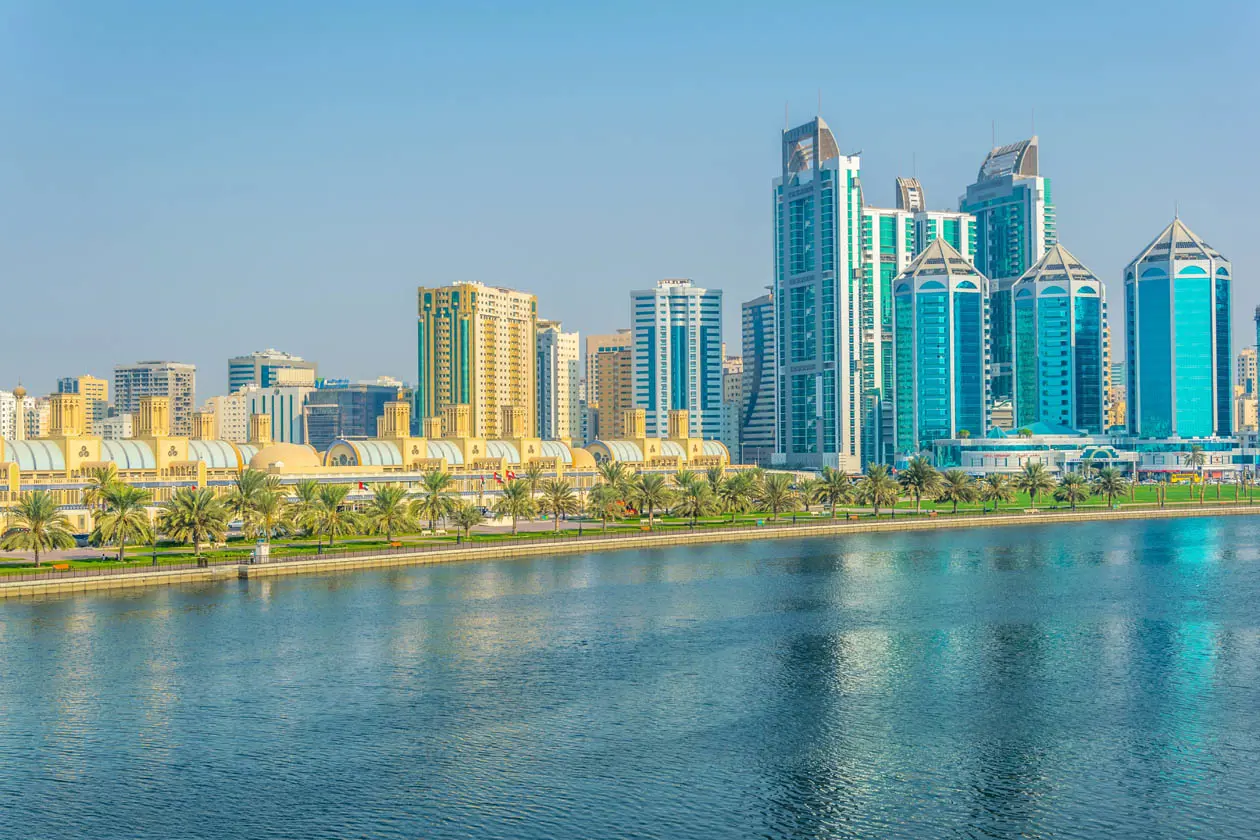
A perfect destination for tourism, Sharjah offers a wealth of unique experiences - cultural, natural, and family-friendly. From mosques to historic monuments, museums to souks, beaches to water sports, and nature reserves to parks, there is so much to discover in this vibrant city.
Must-see tourist attractions in Sharjah

Sharjah’s Historic District
Just beyond the Corniche, the narrow alleyways along the creek in Sharjah’s old town lead to a timeless neighborhood of traditional architecture. Rich in history and art, the area is home to historic houses, galleries, and museums housed within “wind towers” (barjeel structures), including Al Hisn Fort with its rare round tower - unique within the architectural landscape of the UAE.
Among the highlights are the Museum of Islamic Civilization, the Calligraphy Museum, and the Sharjah Heritage Museum. Visitors can also shop for souvenirs in traditional souks like Souq Al Shanasiyah (between Corniche Road and Al Hisn Street), or Souq Al Arsah and Souq Saqr along the waterfront, where you'll find Arabic oils, perfumes, incense, spices, herbs, henna, clothing, fabrics, pearl-inlaid boxes, jewelry, and more.
Don’t miss a stop at a traditional café for a cup of Arabic coffee or a tasting of authentic Emirati dishes.
Sharjah’s mosques
Overlooking Khalid Lagoon along the scenic Buhaira Corniche, Al Noor Mosque is one of Sharjah’s most iconic landmarks. With its elegant domes and two slender minarets inspired by Ottoman design, this mosque - open to non-Muslim visitors - welcomes those wishing to admire its serene beauty and spiritual ambiance. At sunset, the mosque is lit up, offering a fairytale-like atmosphere. Directly across the lagoon lies Al Noor Island, a lush retreat easily accessible by foot and perfect for a peaceful stroll.
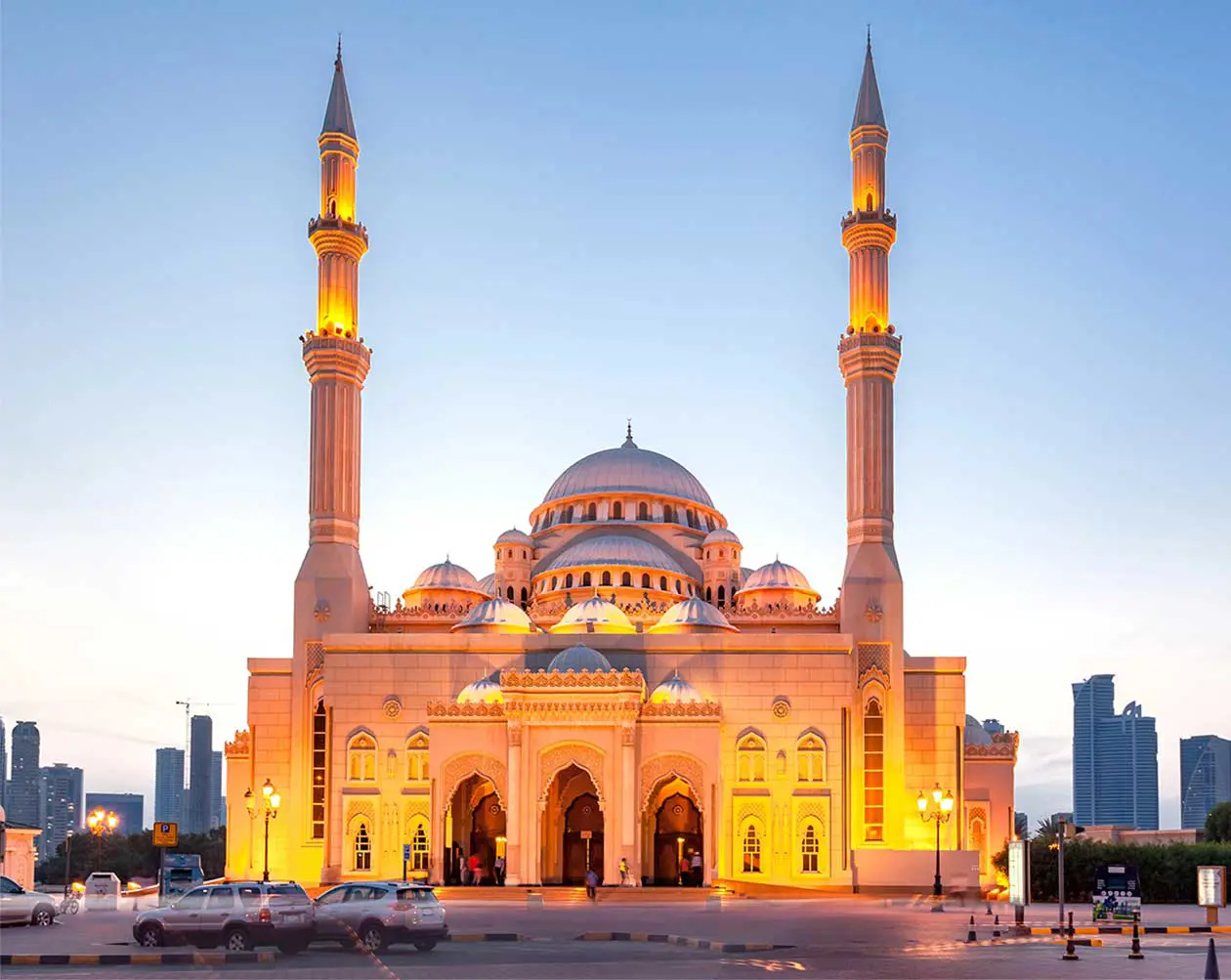
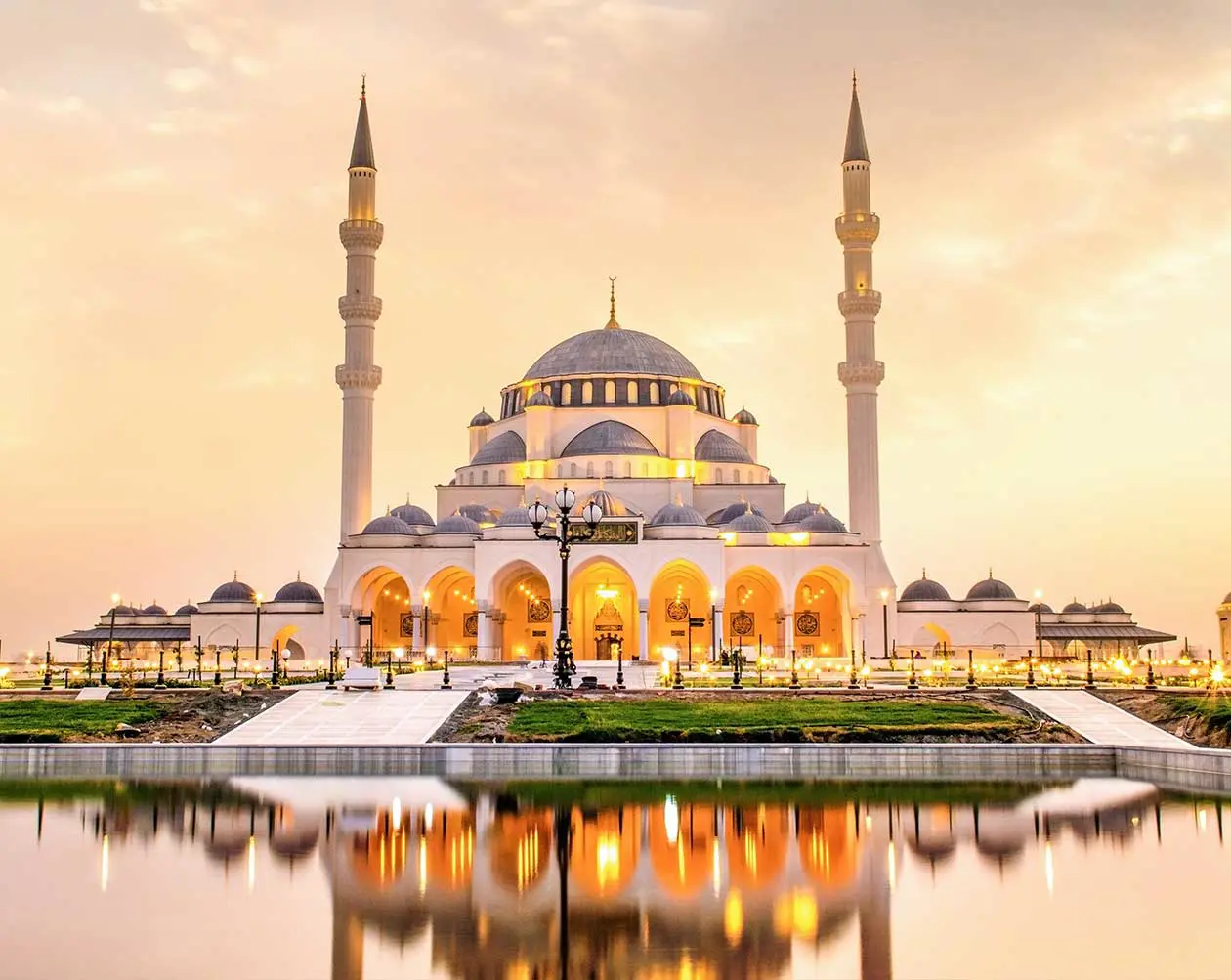
Roughly a 20-minute drive from the city center is the Sharjah Mosque, the largest in the emirate. Capable of hosting up to 25,000 worshippers, it impresses with its monumental scale and refined Islamic design - complete with manicured gardens, scenic fountains, grand columns, domes, and minarets. Inside, visitors will find a prayer hall open to the public, a rich library dedicated to Islamic culture, a gift shop, and a café.
Al Noor Island
Floating in Khalid Lagoon just opposite Al Majaz and Al Noor Mosque, Al Noor Island is a car-free, peaceful oasis that blends nature and art. Accessed by a graceful footbridge behind the mosque, the island transports visitors into a magical world.
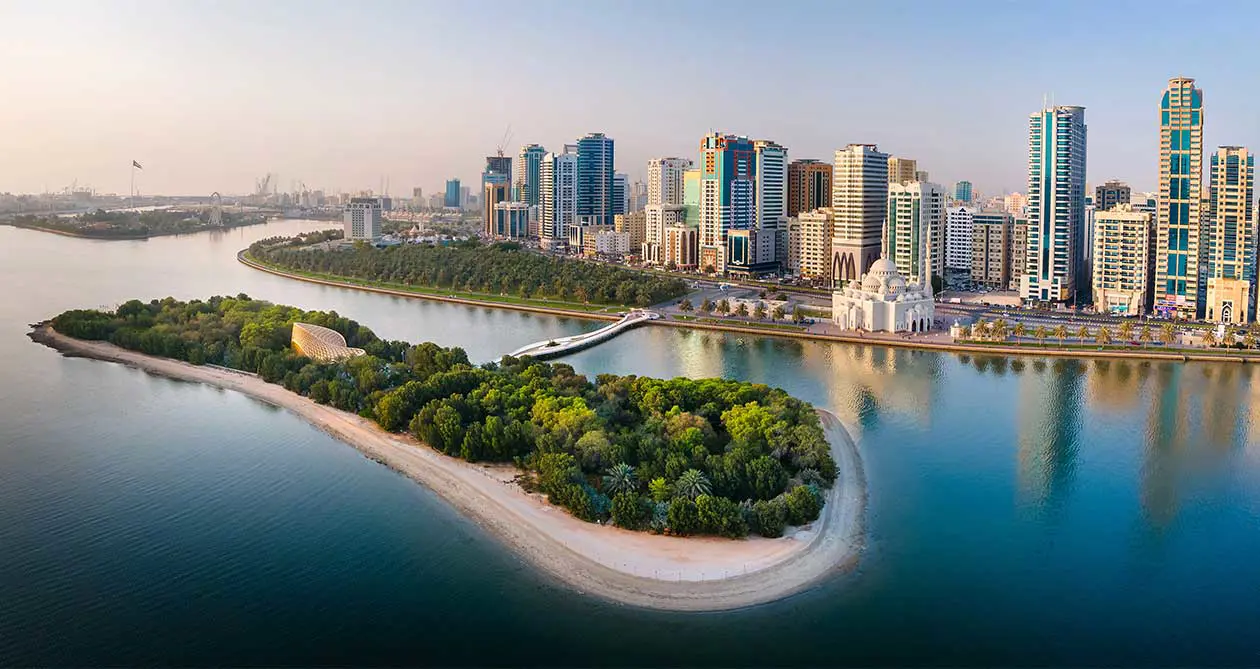
Also known as Butterfly Island, it features the stunning Butterfly House, a tropical biosphere filled with fluttering species. Guests can wander through landscaped gardens, relax at the Literature Pavilion, or admire contemporary sculptures and installations such as the iconic “Ovo.” At twilight, soft lighting and ambient sounds create a dreamlike setting, with unbeatable views of Sharjah’s illuminated skyline.
The Al Majaz waterfront
Lining the shores of Khalid Lagoon along the Buhaira Corniche, Al Majaz waterfront is one of Sharjah’s most popular destinations for families and outdoor fun. Enjoy walking among palm trees and manicured flower beds, cycling along the lakefront paths, watching the Sharjah Fountain light-and-sound show, or playing in water games and mini-golf areas.
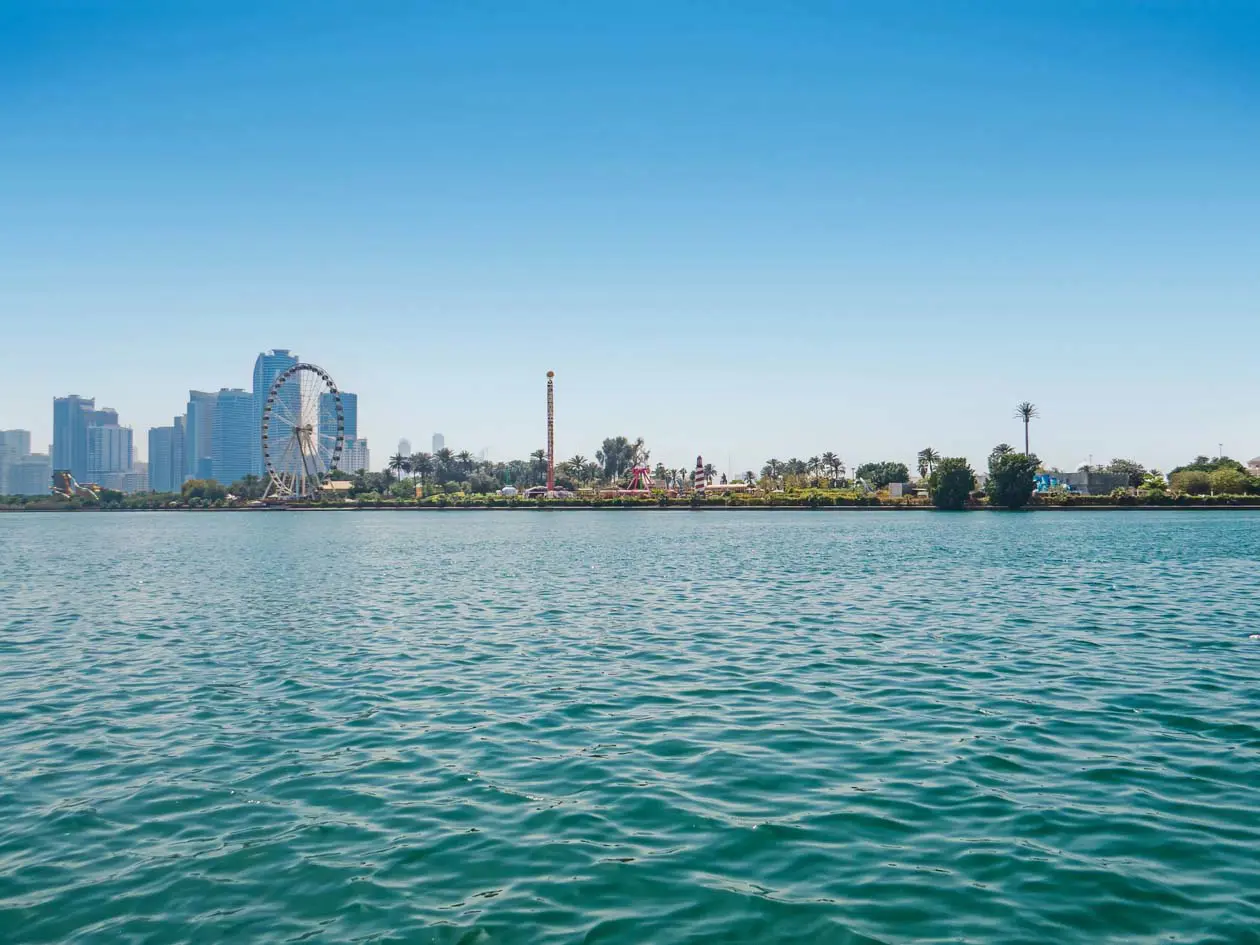
Don’t miss the chance to cruise on a traditional dhow boat and see the city from the water. As the sun sets, Al Majaz becomes even more enchanting - perfect for a romantic or group dinner at one of the many waterfront restaurants and cafés, where the city lights reflect magically on the lagoon.
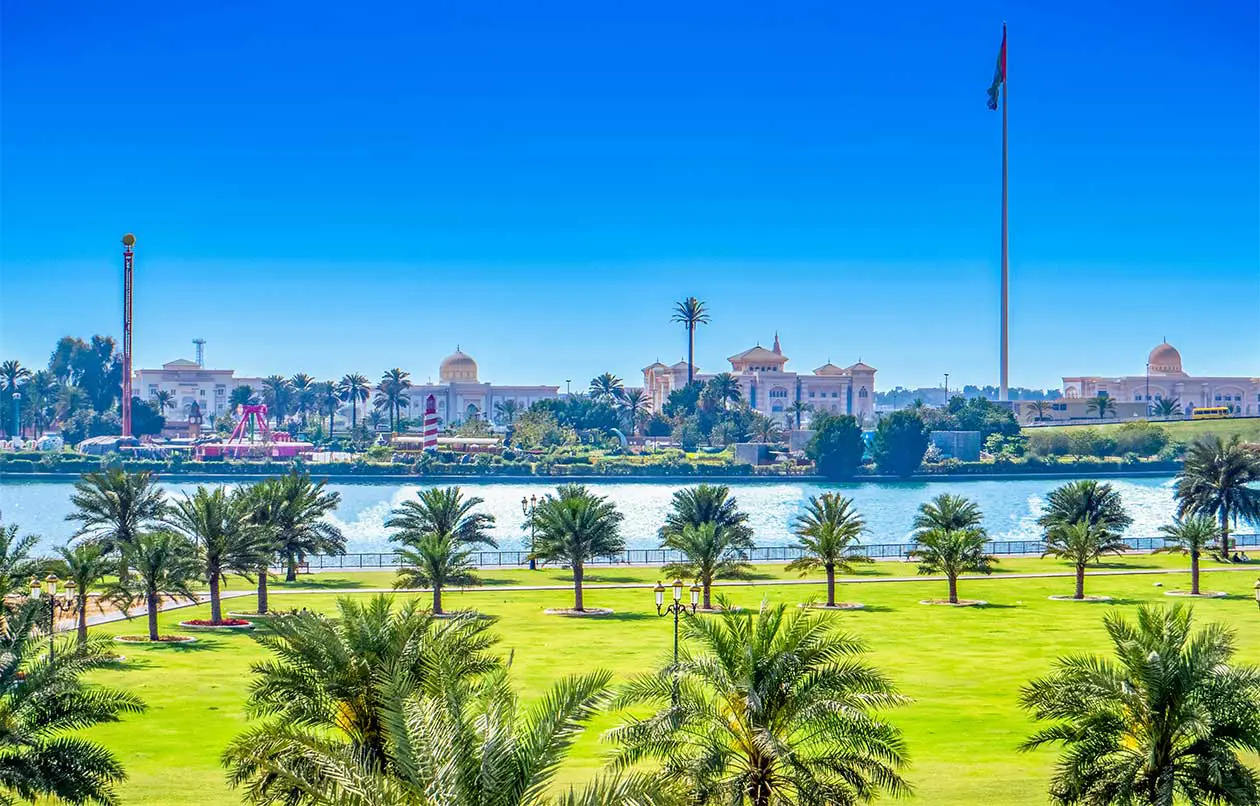
Al Montazah Parks in Sharjah
Located on Flag Island in the heart of Khalid Lagoon, just across from the Central Souk, Al Montazah Parks is one of Sharjah’s most beloved leisure destinations.
A blend of water park and theme park, it's ideal for a day of fun, relaxation, and learning through themed zones inspired by ancient legends. Visitors can enjoy boat rides on the navigable lake, go-kart racing, or performances at the Flag Island amphitheater. For a tasty break, there are plenty of restaurants and cafés - or opt for a picnic on the lush lawns with lagoon views.
Al Qasba
Nestled between Khalid Lagoon and Al Khan Lagoon, Al Qasba is one of the city’s most charming neighbourhoods, especially in the evening. This vibrant district features a kilometre-long canal lined with pedestrian bridges, illuminated reflections, and artistic flair.

A hub of culture and entertainment, Al Qasba is home to the Maraya Art Centre with ever-changing exhibitions, and the Masrah Al Qasba Theatre hosting plays, concerts, and cultural events. Kids can enjoy musical fountains, electric go-karts, and play areas, while families can rent bikes or relax at canal-side cafés. For something extra special, take a boat ride from Al Noor Island to reach Al Qasba and enjoy scenic views of this beloved cultural quarter.
Sharjah’s beaches
Sharjah’s beaches along the Persian Gulf are perfect for relaxing, sunbathing, or trying water sports like surfing, kayaking, parasailing, and flyboarding. Al Khan Beach, near the Sharjah Aquarium and Maritime Museum, stretches 600 meters and features fine sand, showers, and changing facilities.
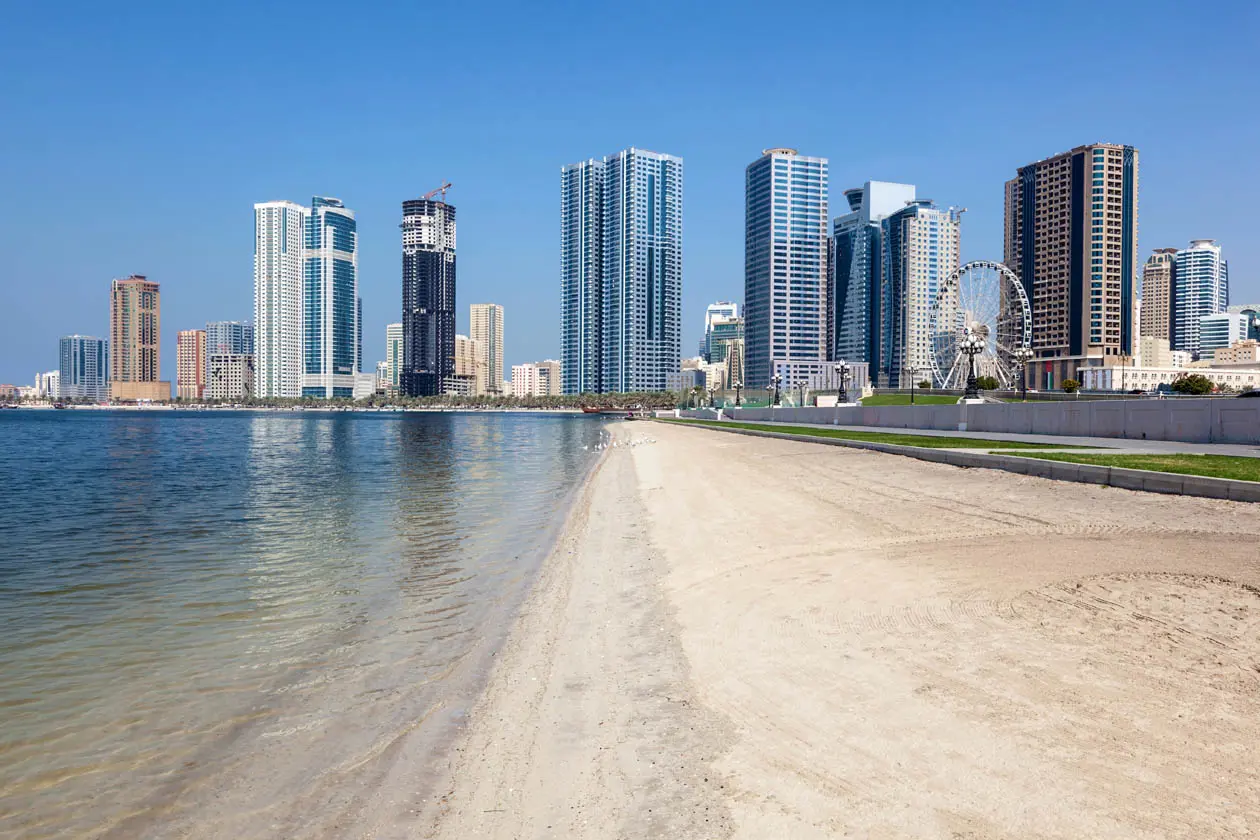
Al Heera Beach, the city’s longest, spans 3.5 kilometers along Al Muntazah Street to Al Rifa'ah beach. It features a jogging track, cycling path, shops and restaurants, sports courts, children’s play areas, and the Kota Skate Park for rollerblading, scootering, and motocross. For fishing, Al Mamzar Beach near the Sharjah Aquarium is ideal, nestled between Al Khan Lagoon to the north and Al Hamriya Port to the south. Al Hamriyah Beach, family-friendly and accessible for people with disabilities, offers white sand and areas for football and volleyball.
Sharjah Aquarium
Located in the historic Al Khan district, the Sharjah Aquarium is the largest government-run educational center in the UAE and the perfect place to explore the marine biodiversity of the Persian Gulf. Its tanks recreate coral reefs, tidal pools, lagoons, and mangroves, and a walkway lets visitors observe marine life up close.
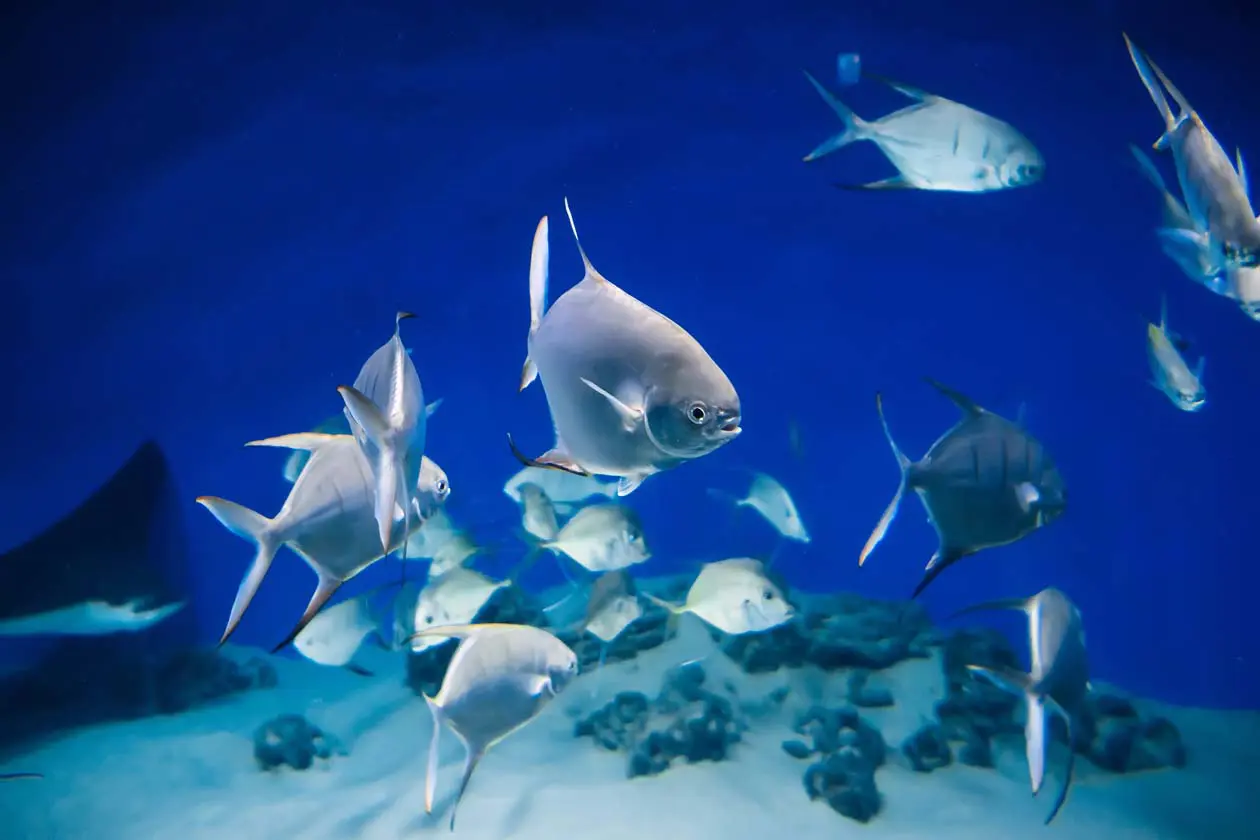
Ideal even for evening visits, the aquarium is great to pair with a day at nearby Al Khan Beach. The entrance fee also includes access to the Sharjah Maritime Museum, where guests can learn about the city’s deep connection to the sea, including fishing traditions and the historic role of the coast.
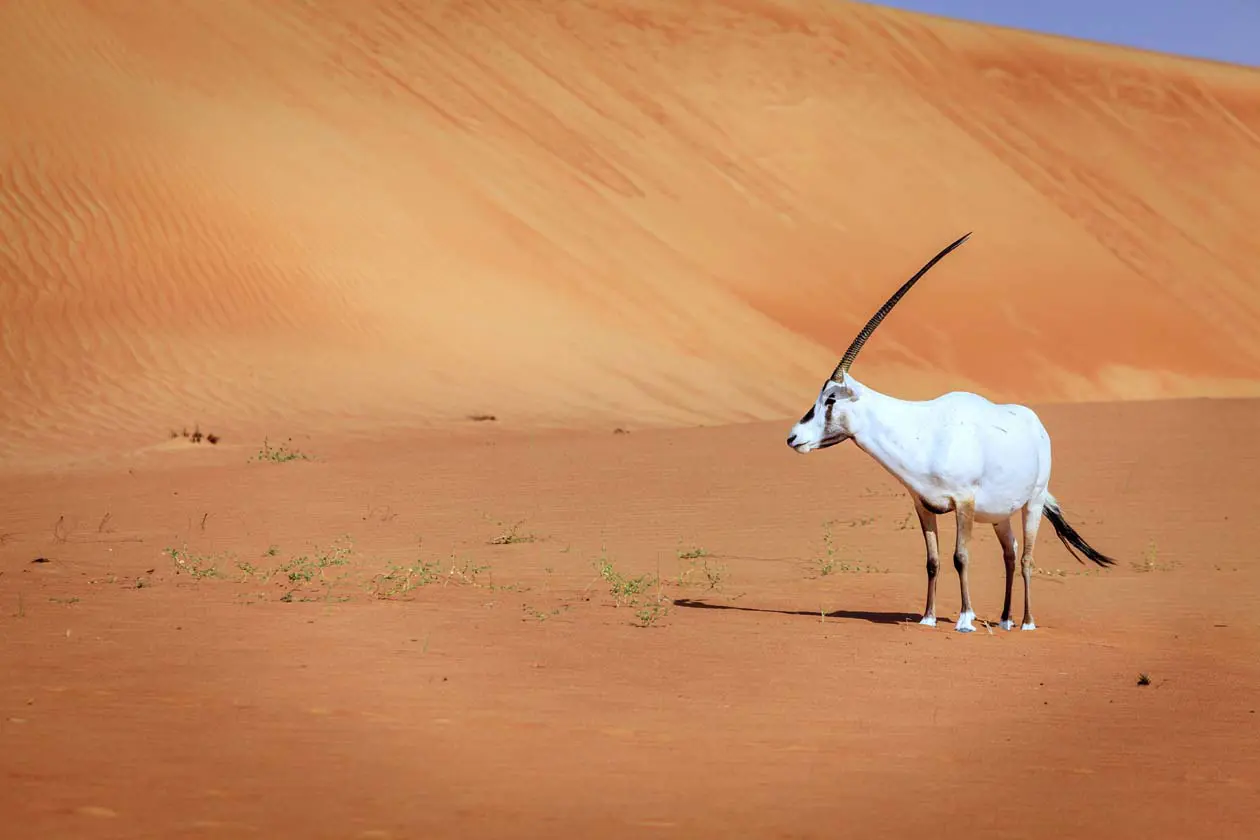
Wasit Nature Reserve
Located in the Ramtha area within the urban limits of Sharjah, the Wasit Nature Reserve is home to a thriving ecosystem of native flora and fauna -including sand dunes, salt flats, ponds, and a serene lake. Visitors can spot bird species, small mammals, reptiles, insects, and even the endangered Arabian oryx, a national symbol of the UAE. Electric golf carts are available for convenient touring.

Partnership with GetYourGuide

Istanbul is a city that leaves a lasting impression. A crossroads between East and West, Europe and Asia, this vibrant metropolis perched along the Bosphorus has enchanted travellers for millennia with its cultural heritage, lively spirit, and a cuisine that tells the story of the world. The perfect destination for a city break, Istanbul is a seamless blend of history and modernity - where even a few days can feel like a once-in-a-lifetime journey through iconic monuments, creative districts, and timeless traditions.
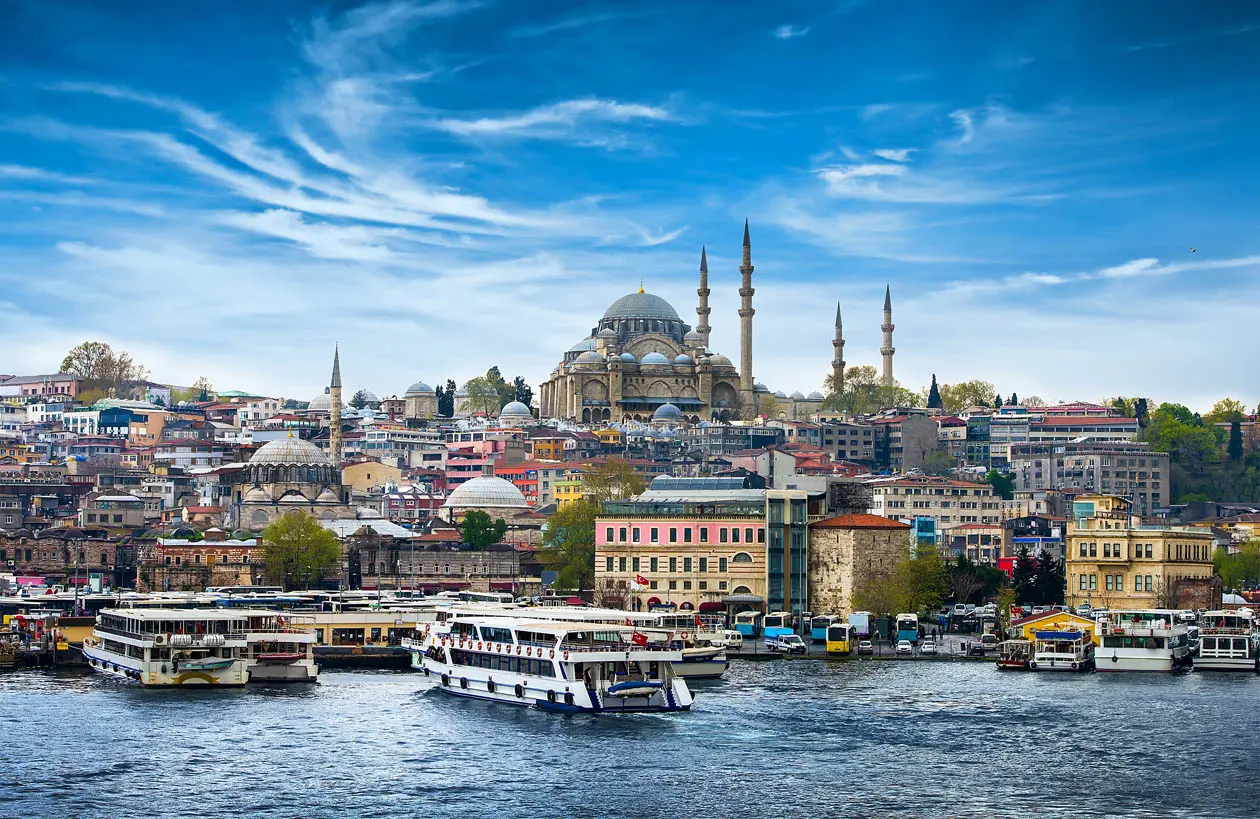
Sultans, spices, and Byzantine marvels
A perfect way to begin any stay in Istanbul is by exploring the Historic Peninsula, the ancient heart of the city where time seems to stand still. Here rises the majestic Hagia Sophia Grand Mosque, with its massive dome seemingly suspended between heaven and earth and interiors steeped in centuries of Byzantine and Ottoman art. Just a short walk away, the Blue Mosque captivates with its graceful architecture, six slender minarets, and more than 20,000 turquoise ceramic tiles that give it its name.
Don’t miss the Hagia Sophia History and Experience Museum, offering a multi-sensory journey through the building’s millennia-old history.
A few steps further, the magnificent Topkapı Palace awaits - once the residence of Ottoman sultans, where richly tiled halls hold treasures, ceremonial weapons, precious jewels, and religious relics from the East.
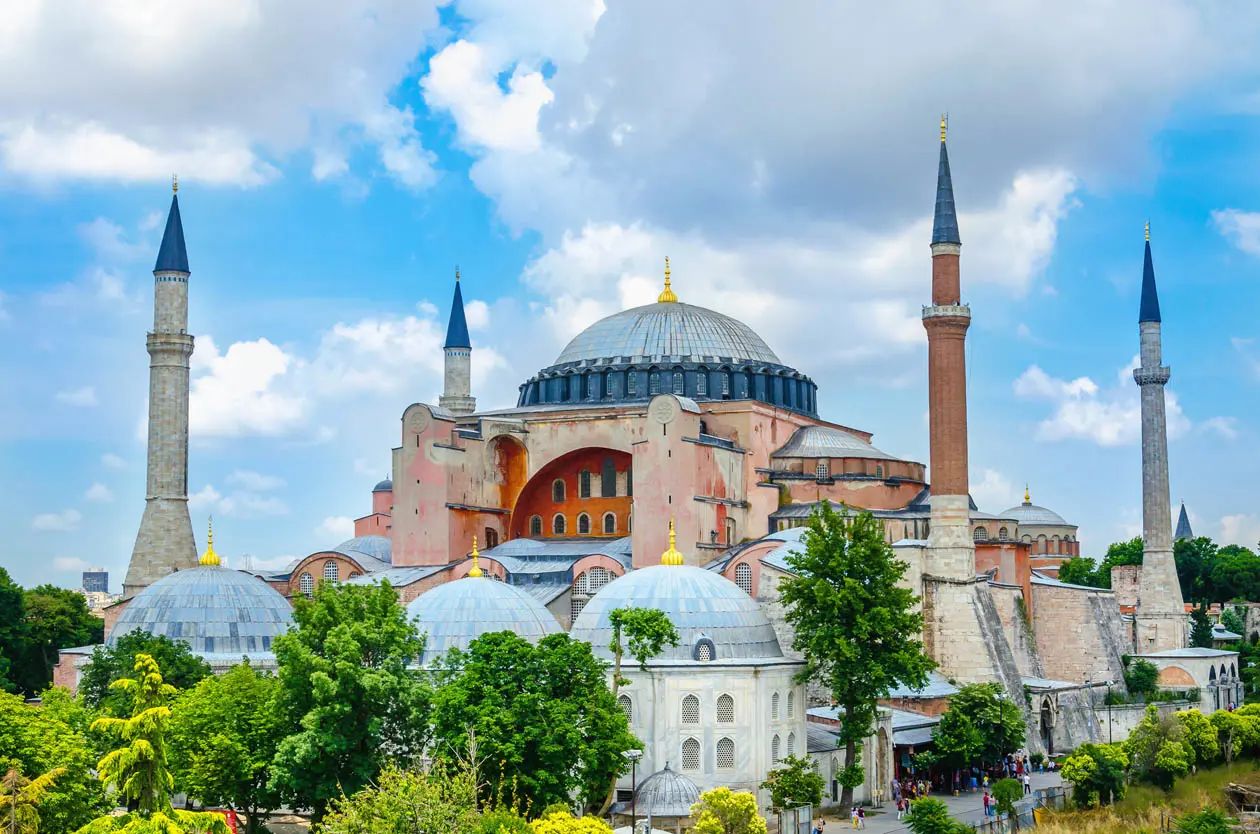
For a break in the shade, head to Gülhane Park (once the sultans’ private garden) now a peaceful haven perfumed by roses with sweeping sea views.
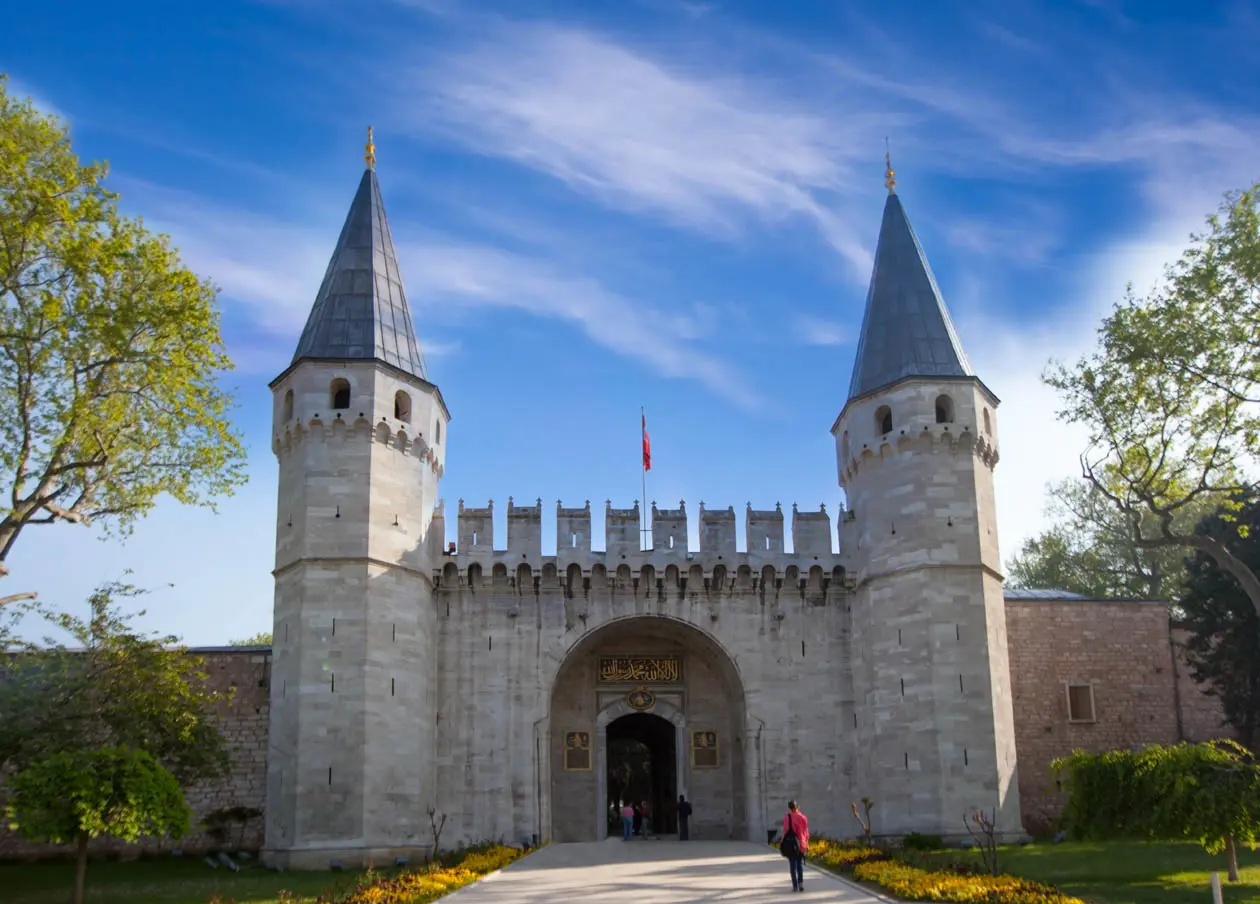
Then immerse yourself in the colors and aromas of the Grand Bazaar, one of the oldest and most fascinating covered markets in the world: a labyrinth of over 4,000 stalls selling carpets, ceramics, gold jewellery, spices, and more.
Nearby, the Spice Bazaar, built in the 17th century, is a riot of eastern fragrances, Turkish delights, dried fruits, and medicinal herbs, a true feast for the senses.
From the Bosphorus to creative modernity

Another day can be devoted to discovering the Bosphorus, the strait that divides Europe from Asia. A ferry ride unveils spectacular views of both shores: Ottoman mansions, waterfront mosques, suspension bridges, and flocks of seagulls. A sunset cruise is a poetic experience not to be missed.

On the European bank sits the splendid Dolmabahçe Palace, a 19th-century imperial residence that stuns with its neo-Baroque elegance.
Once ashore, head to the Karaköy district, one of the city’s most creative and trendsetting neighbourhoods.
Hip cafés, art galleries, and independent boutiques line the streets leading to Galataport Istanbul, the city’s modern seafront hub where culture, shopping, and dining meet the sea.
Here you'll find Istanbul Modern, Turkey’s premier museum of modern and contemporary art, housed in an iconic building designed by Renzo Piano. From Karaköy, hop on the Tünel, the historic 1875 underground funicular, to reach the famous İstiklal Caddesi, Istanbul’s most vibrant pedestrian boulevard. Lined with bookshops, theatres, churches, art galleries, and the nostalgic Red Tram, it's a place where the past and present collide.
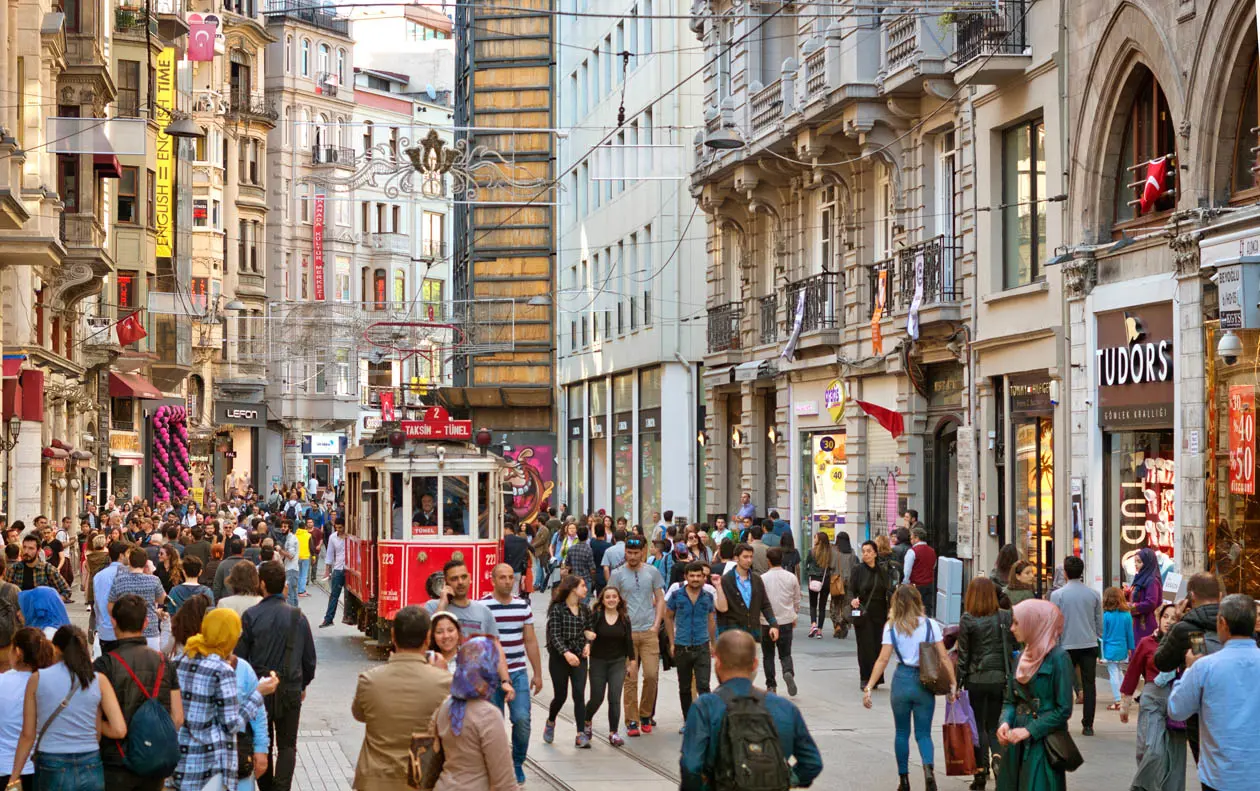
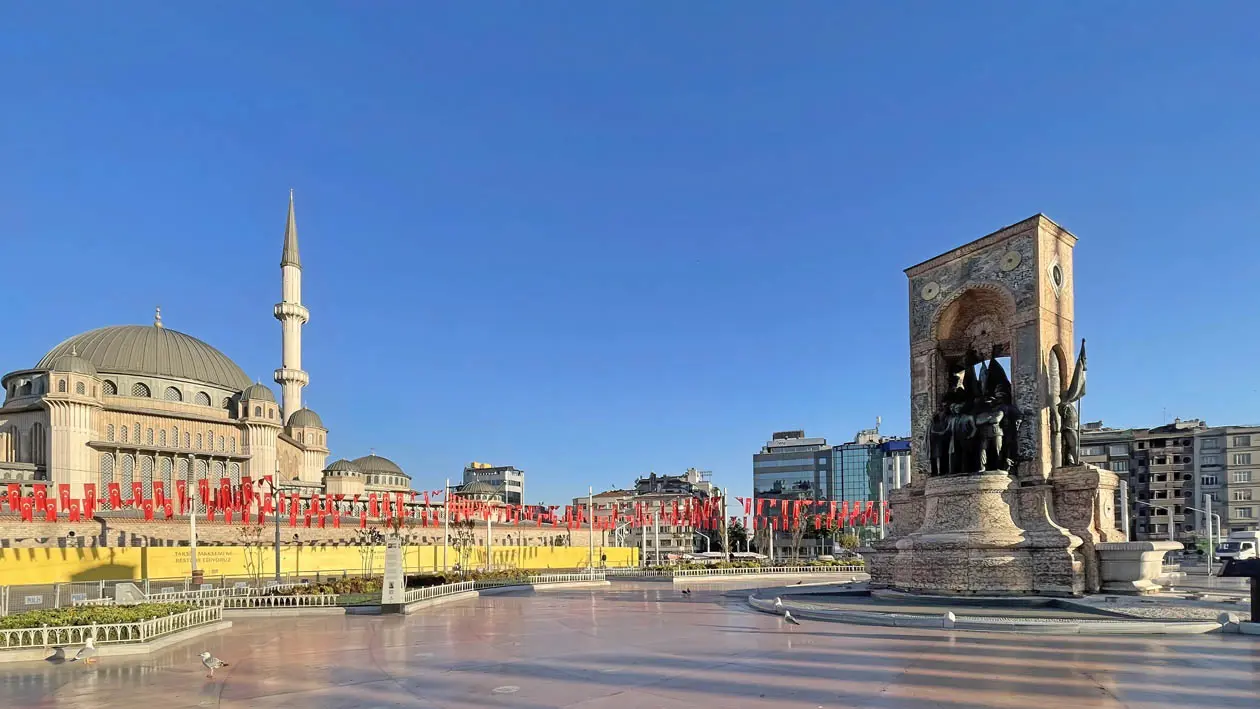
The Princes’ Islands: a day trip from Istanbul
For a break from the city’s hustle, spend a day exploring the enchanting Princes’ Islands in the Sea of Marmara. Known in Turkish as Kızıl Adalar ("Red Islands"), these islands are a beloved summer escape. The archipelago comprises nine islands, four of which - Büyükada, Heybeliada, Burgazada, and Kınalıada - are regularly connected to both the European and Asian shores of Istanbul by ferry. No motor vehicles are allowed on the islands - only electric minibuses are permitted - so you’ll explore by foot or bicycle.
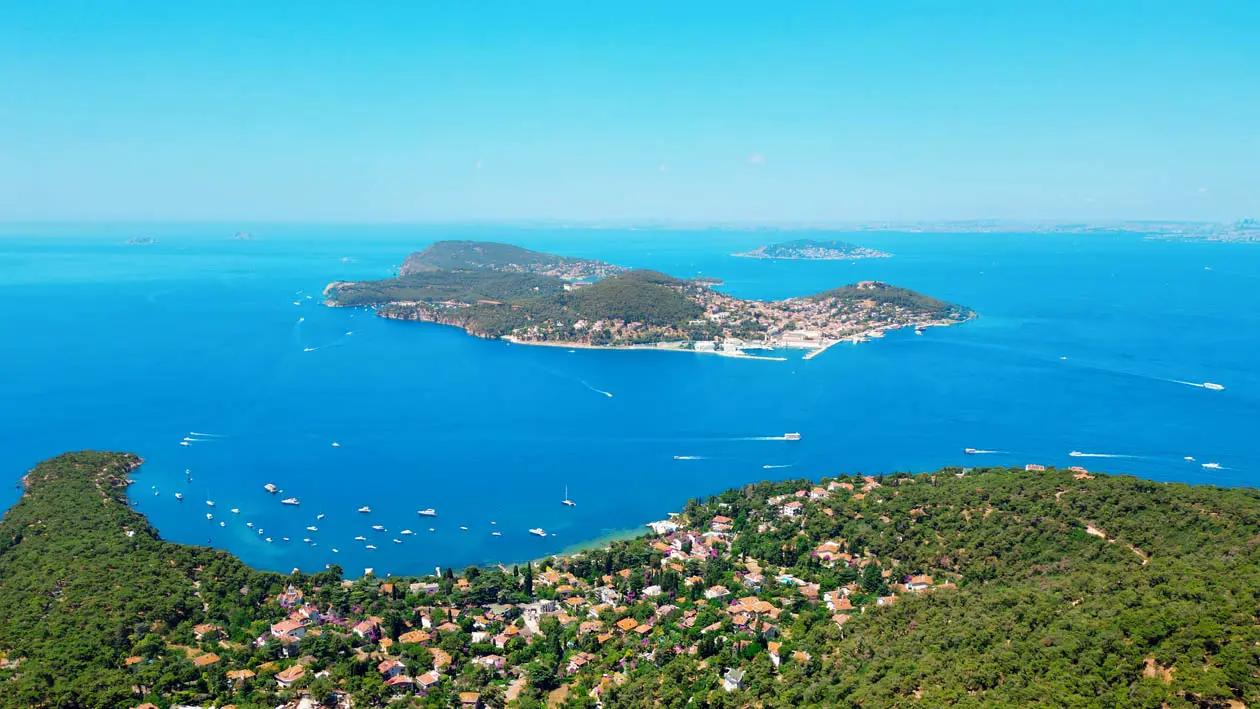
Strolling under canopies of trees on Büyükada, the largest island, you’ll discover exquisite Ottoman villas and pastel-colored Victorian cottages, while churches, monasteries, and palaces whisper stories of the past. The islands offer sandy beaches, rocky coves, floating swim platforms, and stylish beach clubs. Sedef Adası, the smallest and most exclusive island, is reachable only by small boats departing from Büyükada.
The Flavors of Istanbul
Between one site and the next, Istanbul delights at the table as much as it does in the streets. Start your day with a traditional Turkish breakfast, a daily ritual featuring regional cheeses (tulum, kaşar, çökelek, or mihaliç), olives, cucumbers, tomatoes, honey, kaymak (clotted cream), homemade jams, and the essential simit (a sesame-crusted bread ring) served with steaming tea in tulip-shaped glasses.
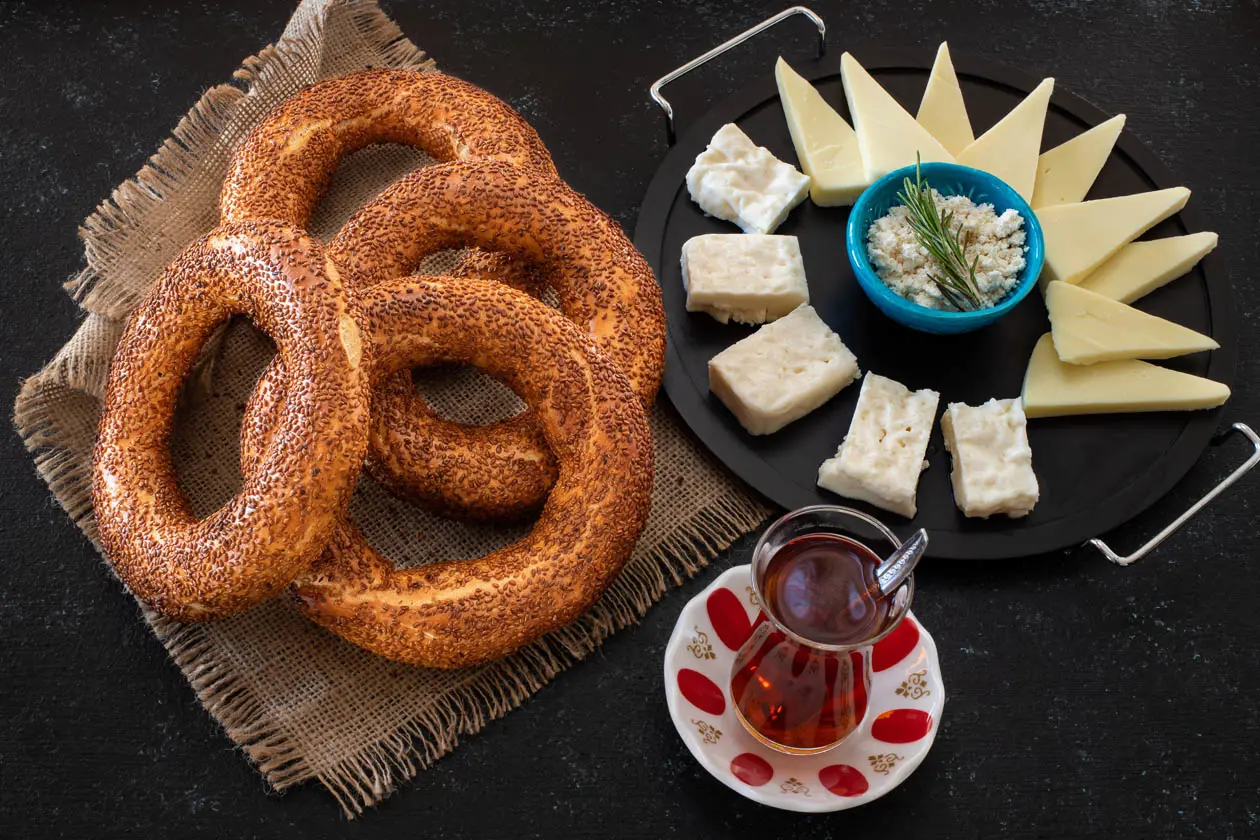


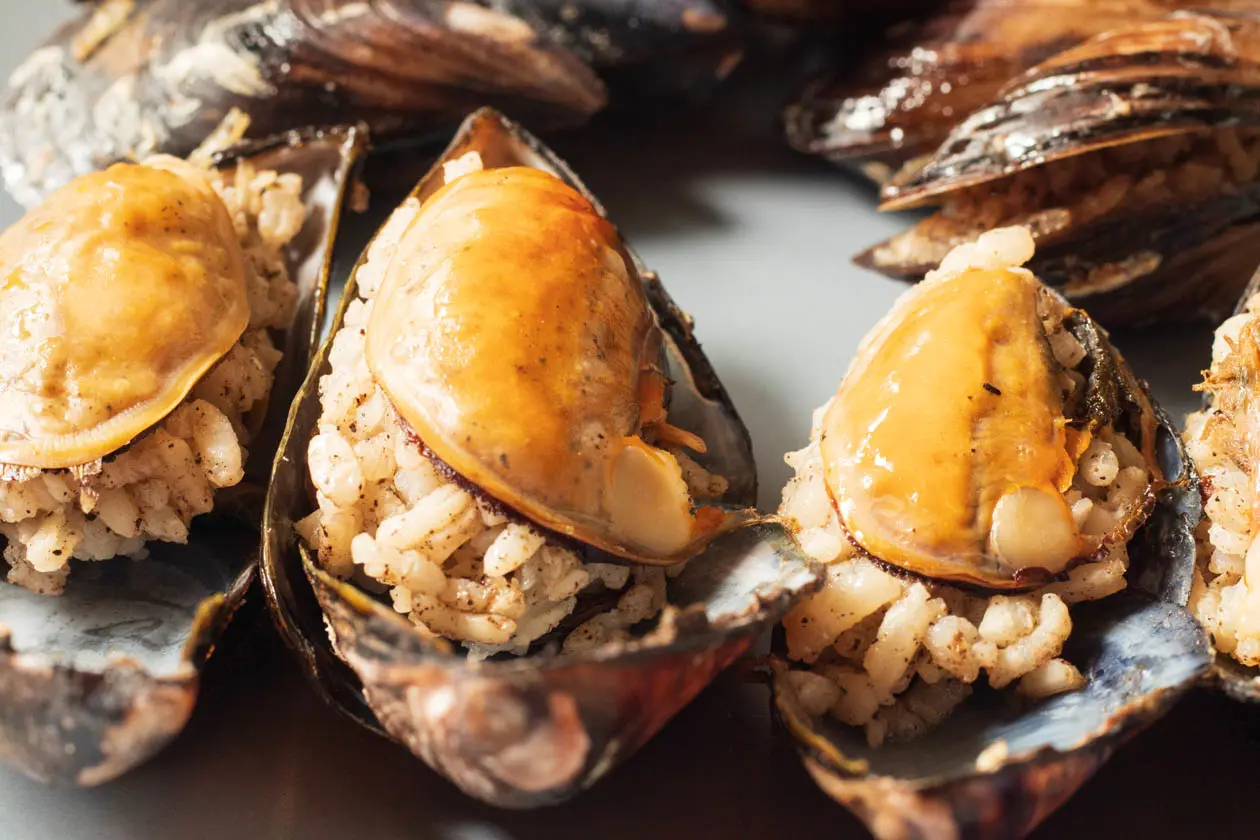
Photo Copyright © Sisterscom.com / Depositphotos
For lunch, a must-try is the famous Sultanahmet köfte, grilled meatballs served with warm bread and salad. For a quick snack, Istanbul’s streets are a paradise of flavors: roasted chestnuts, grilled corn, spicy kokoreç, and fragrant stuffed mussels.
In the evening, head to a meyhane, a classic Turkish tavern where you can savor a selection of meze, fresh fish, and a glass of rakı, all in a lively, music-filled atmosphere. It’s an authentic and heartfelt way to connect with the city’s warm and hospitable soul.
SUMMER IN HELSINKI
The best beaches for relaxation, nature, and sunshine under Finland’s endless sky
Text by Enzo Cuppatri
The elegant Finnish capital of Helsinki captivates in every season, but it’s during summer that the city reveals its brightest and most surprising side. The days stretch on until they blend into the night, wrapped in the golden glow of the midnight sun, creating a suspended atmosphere where time feels infinite. In this unique light, the Nordic lifestyle truly shines: from parks and outdoor cafés to waterfront promenades and forest trails, the city invites you to slow down and embrace the beauty of simplicity.
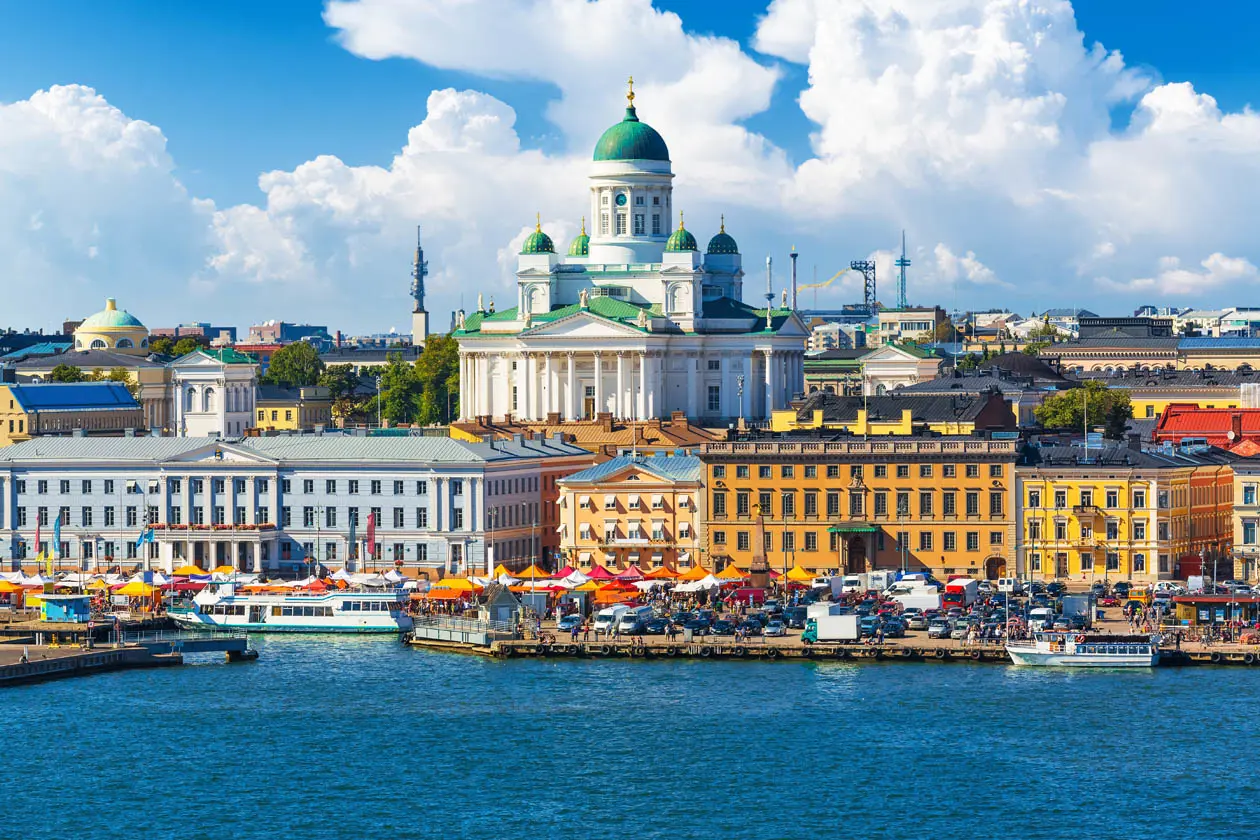
Summer is the perfect time to discover Helsinki’s beach culture: sandy shores, hidden coves, crystal-clear lakes, and lush green islands offer ideal settings for swimming, sunbathing, or simply unwinding. Even a midnight dip becomes a magical experience under a pale sky that never turns dark.
Hietaranta beach
One of the most popular spots for sunbathing in Helsinki is undoubtedly Hietaranta, one of the city’s best-loved sandy beaches. Mornings here are peaceful and refreshing, while by midday the area comes alive with families, sports enthusiasts, and swimmers, thanks to the many amenities available.
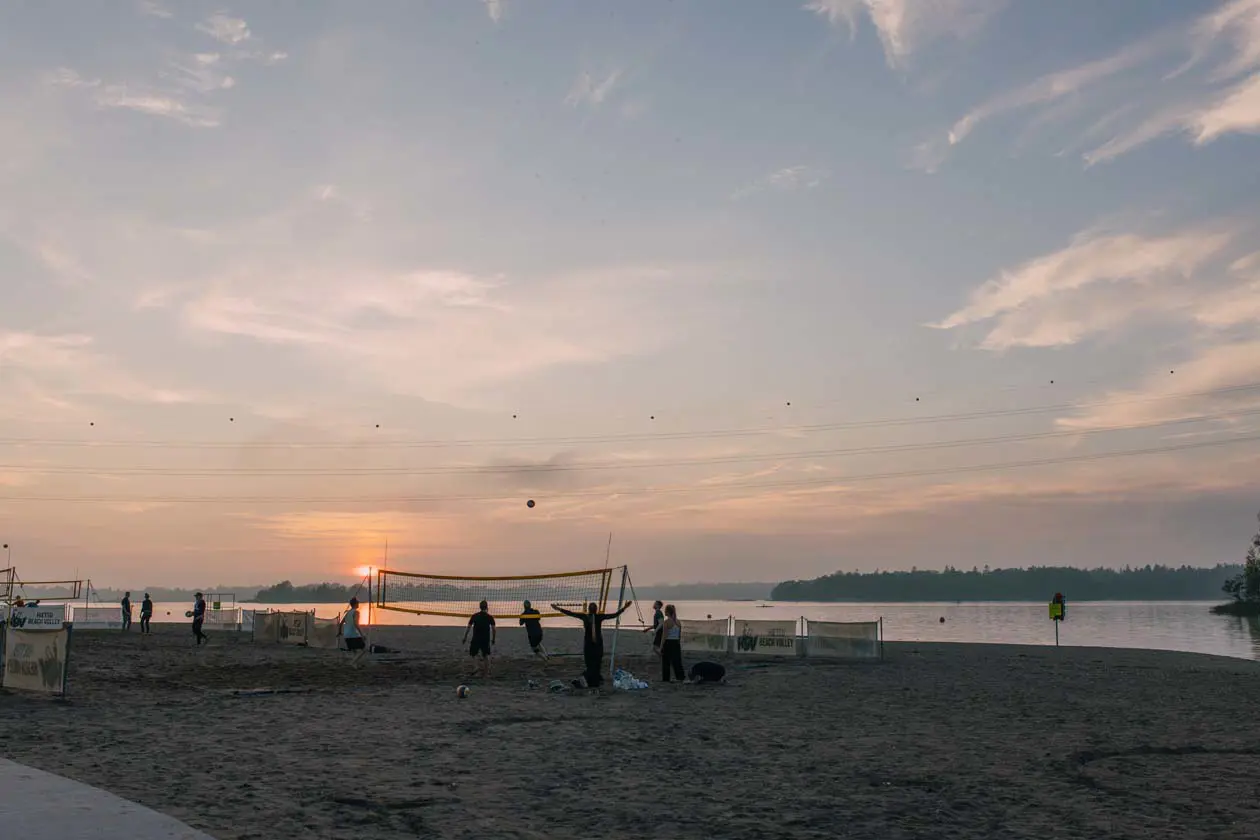
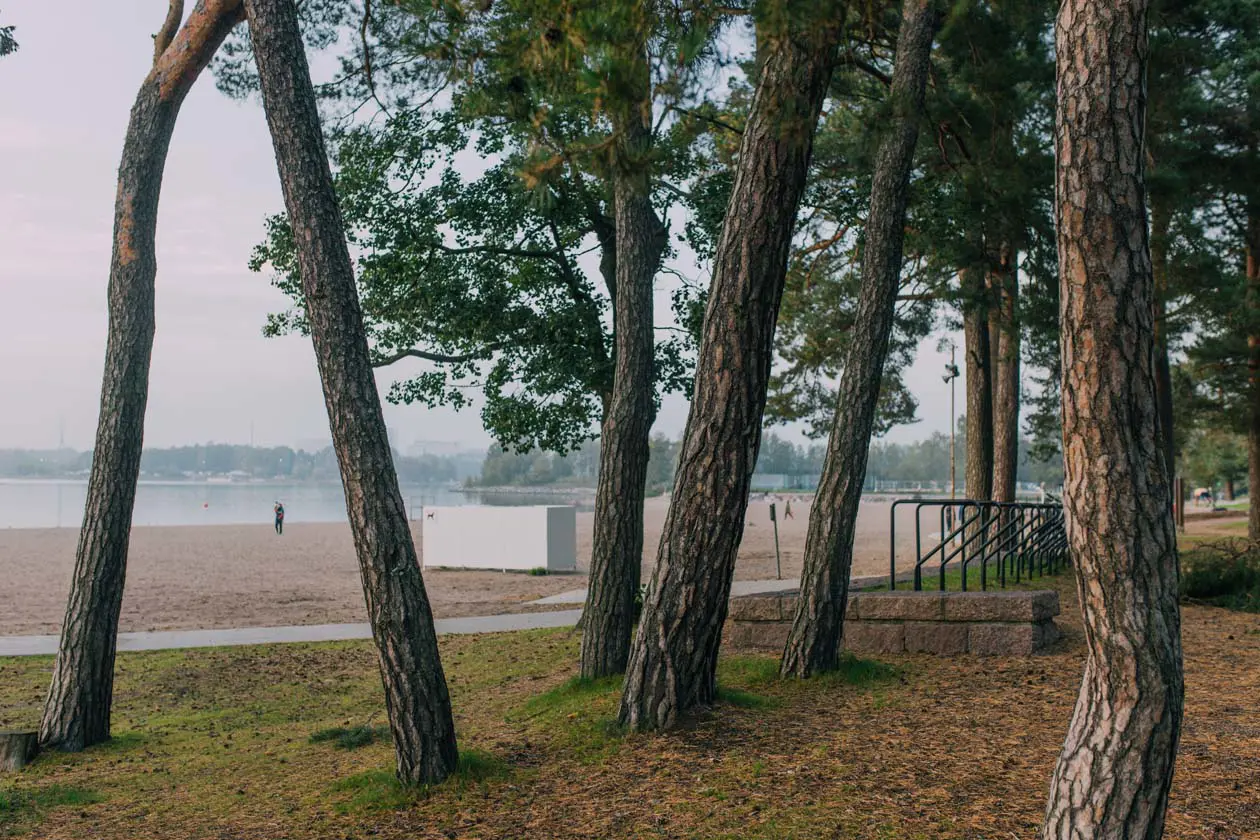
The beach offers basketball and beach volleyball courts, outdoor fitness equipment, a playground for children, and all the necessary facilities: showers, restrooms, changing rooms, and lifeguard supervision throughout the summer until mid-August.
Adding to the experience is Badenbaden, a summer terrace café perfect for a quick snack or a drink with a bay view. Nearby you’ll also find the Taivallahti Tennis Centre and a mini-golf course, making it easy to round out your day with a mix of sport and relaxation.
Aurinkolahti beach
Located in the lively Vuosaari district, Aurinkolahti Beach gently curves along the coast for about 700 meters, offering a particularly scenic seaside experience right in Helsinki.
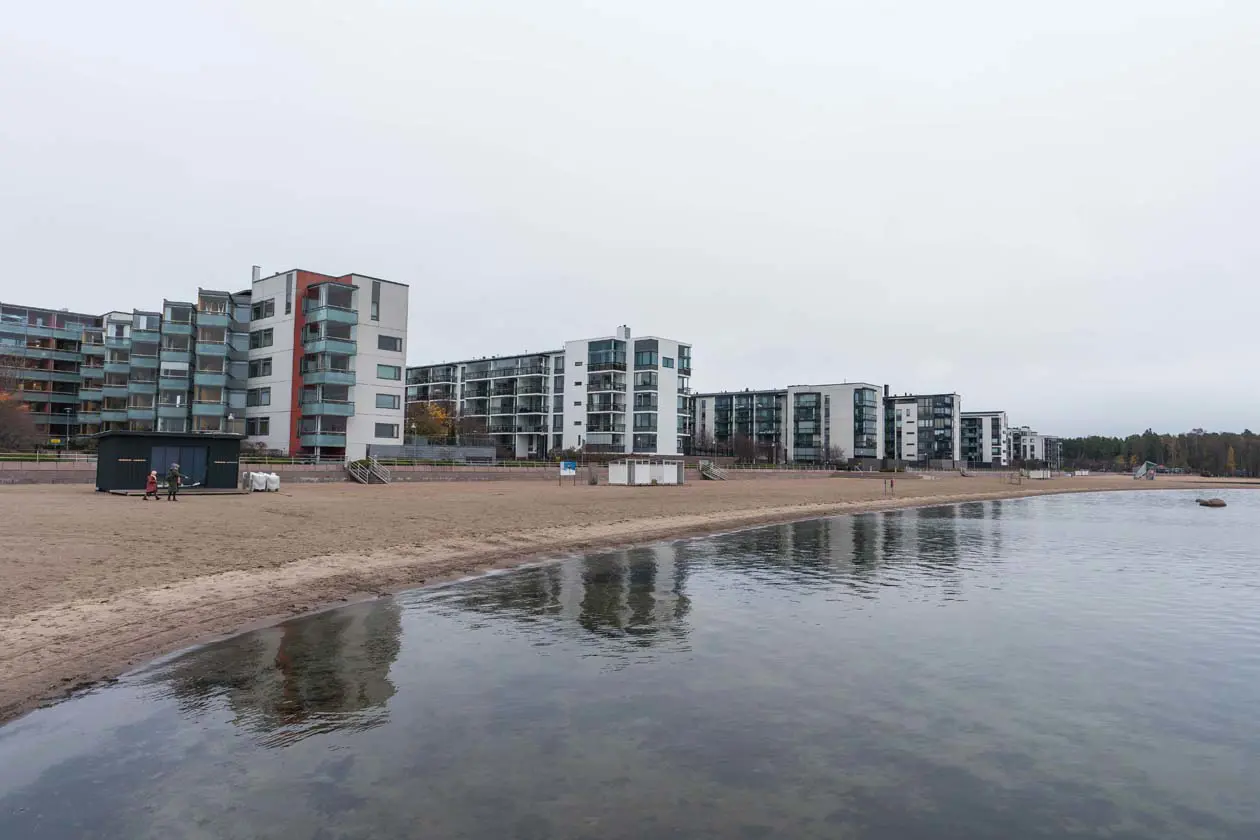
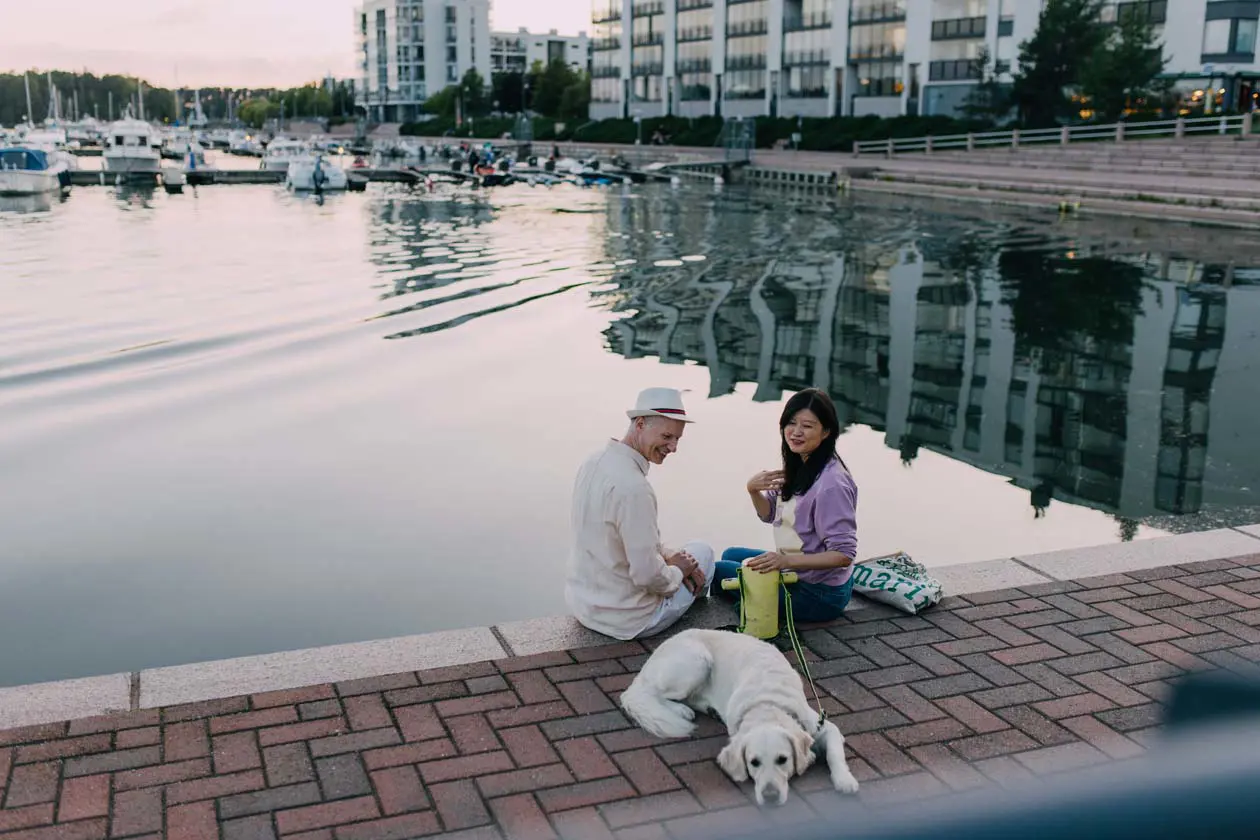
Its fine sand and shallow waters make it ideal for families with young children, who can play and swim safely. Just steps from the shoreline are sports and leisure facilities: a basketball court, an outdoor fitness area, and the option to rent a SUP board and head out on the water. The beach features a bar, changing rooms, and lifeguards throughout the summer season, everything you need for a fun and relaxing day in the sun.
The beaches of Mustikkamaa
The island of Mustikkamaa is a lush green oasis just a few kilometers from downtown Helsinki, located south of Kulosaari and easily accessible on foot via a pedestrian bridge.
Here you’ll find a shallow sandy beach tucked into a charming natural setting, ideal for a refreshing swim or relaxing in the sun.
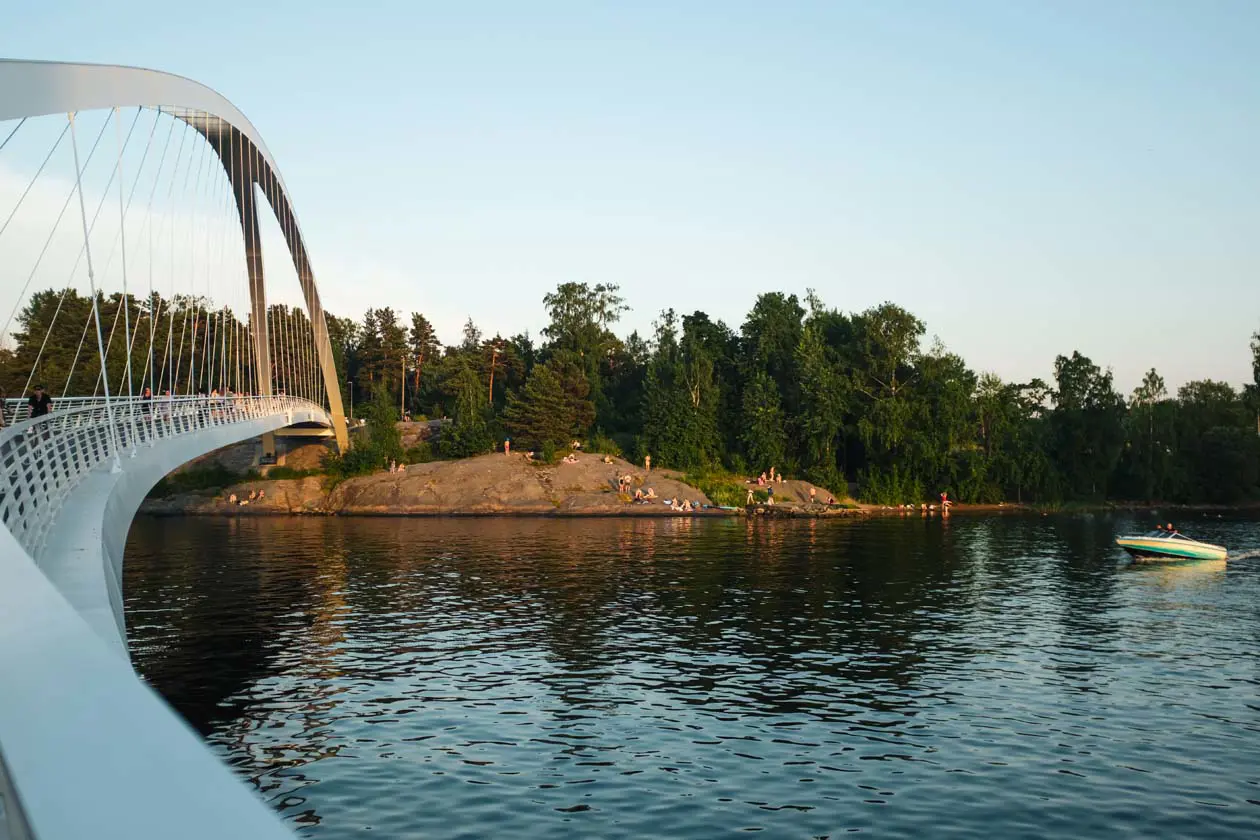
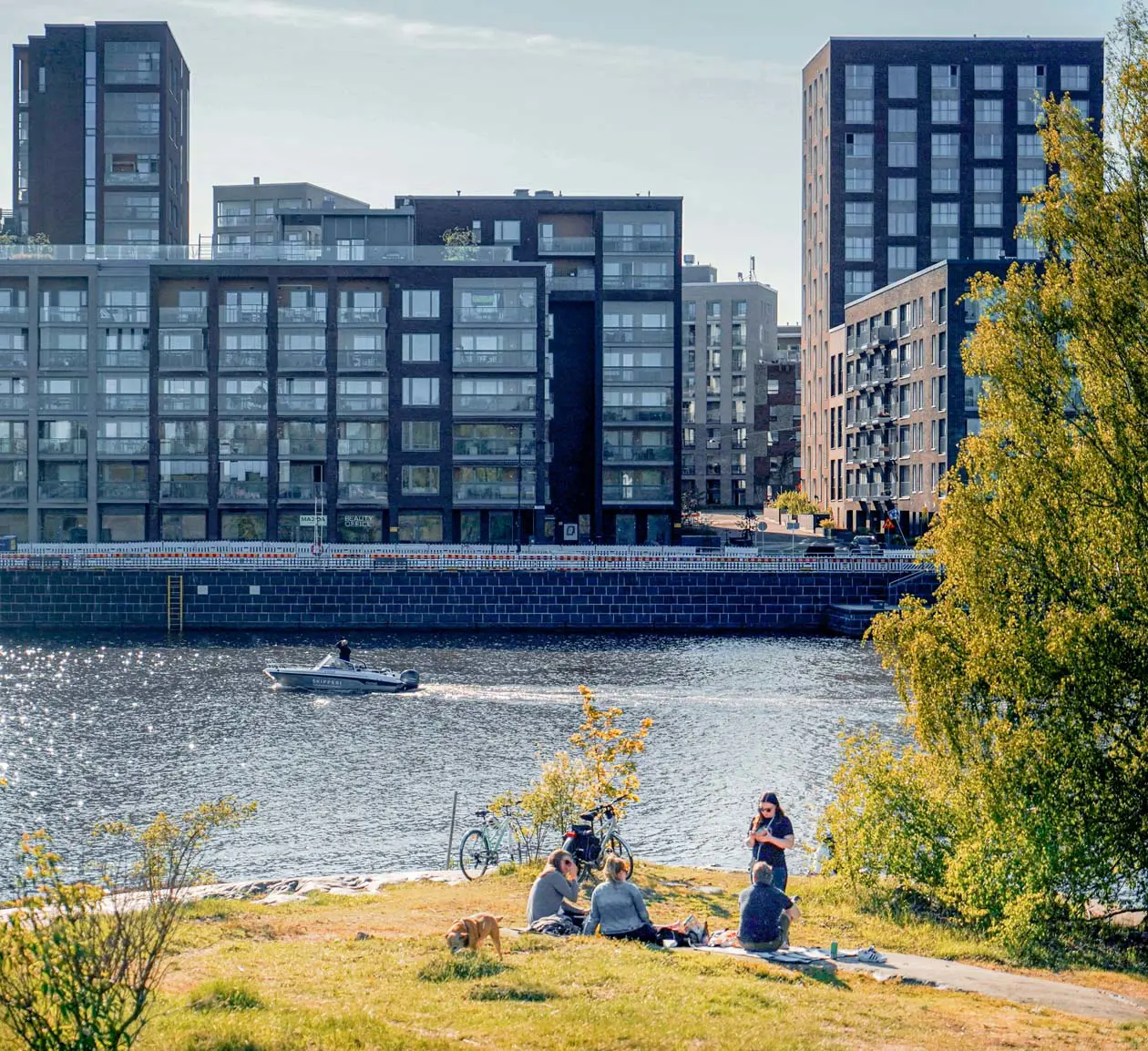
Smooth granite rocks offer perfect sunbathing spots, while more secluded areas provide peace and spectacular sea views.
Mustikkamaa is a favorite among both young people and families, thanks to its wide range of services: changing rooms, showers, lifeguards, fitness zones, an open-air theatre, and courts for football, basketball, and tennis.
A short walk across the island leads to Korkeasaari, home to Helsinki’s renowned zoo, one of the city’s most popular attractions in the summer.
Mustasaari Island
The enchanting beach on Mustasaari Island is considered one of the most beautiful in Helsinki. Owned by the Helsinki Parish Union, the island is open to the public and easily reached by a 15-minute ferry ride from the city center. Surrounded by calm seas and sheltered from strong waves thanks to nearby Hevossaari Island, it’s a peaceful retreat for those seeking quiet in nature.
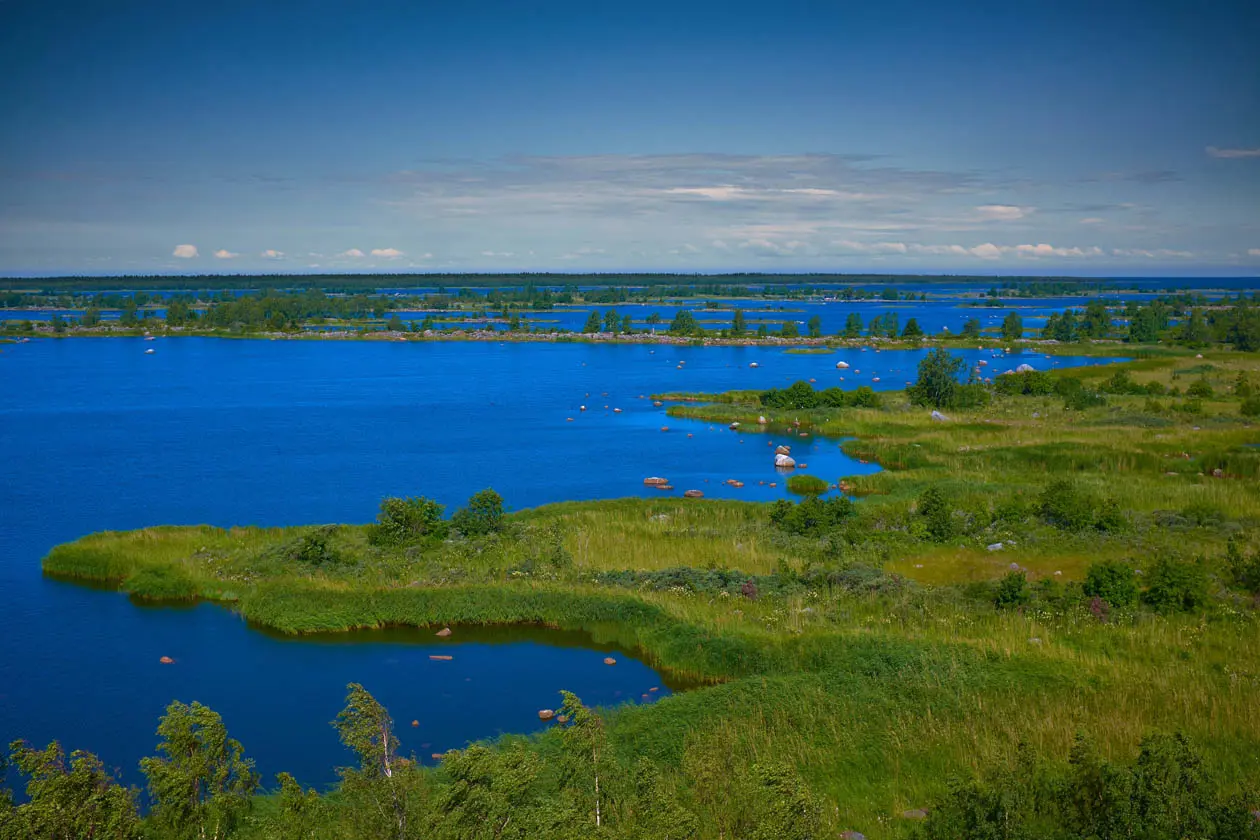
Facilities include cabins, showers, a children’s playground, and a cozy café where you can enjoy traditional korvapuusti (Finnish cinnamon rolls). Mustasaari is also a popular location for summer camps organized by the parish union. But, the dogs are not allowed on the island.
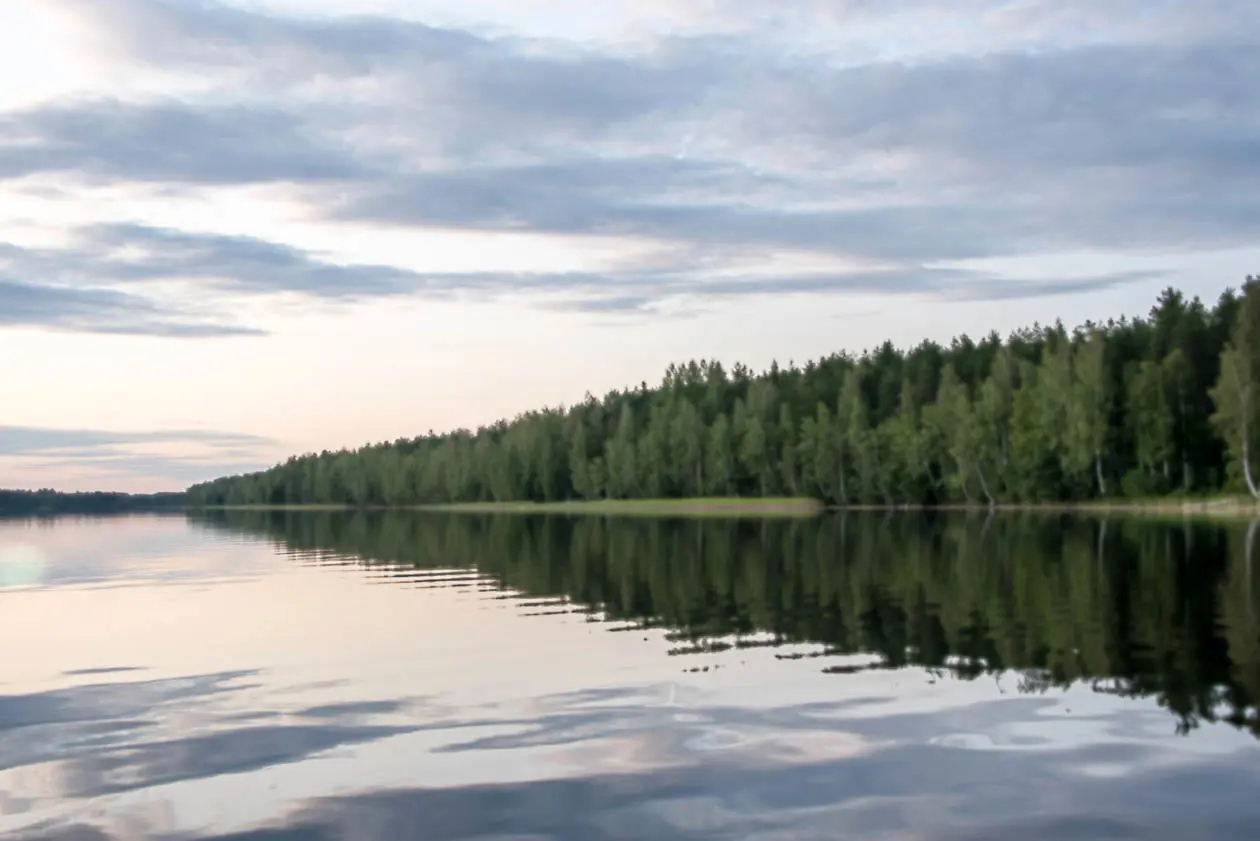
Myllyjärvi Lake
In the greater Helsinki area, the municipality of Espoo is home to two beautiful wild lakes. One of the most notable is Lake Myllyjärvi, famed for its clear waters and tranquil atmosphere, perfect for a rejuvenating break far from the urban buzz. Located in a nature reserve, the lake is accessible via a short uphill path (about 100 meters) through lush greenery.
A small beach with wooden cabins and picnic areas makes it ideal for a full day outdoors: whether you’re diving into the refreshing water or enjoying a quiet moment among the trees, Myllyjärvi offers a perfect taste of Finnish nature.
Pihlajasaari Island
Much loved by Helsinki locals, Pihlajasaari Island is a classic summer destination just ten minutes by ferry from the city center. It’s perfect for anyone seeking a beach day surrounded by nature. The island features sandy beaches, sun-drenched rocks, grassy lawns, and a small forest home to a wide variety of birdlife.
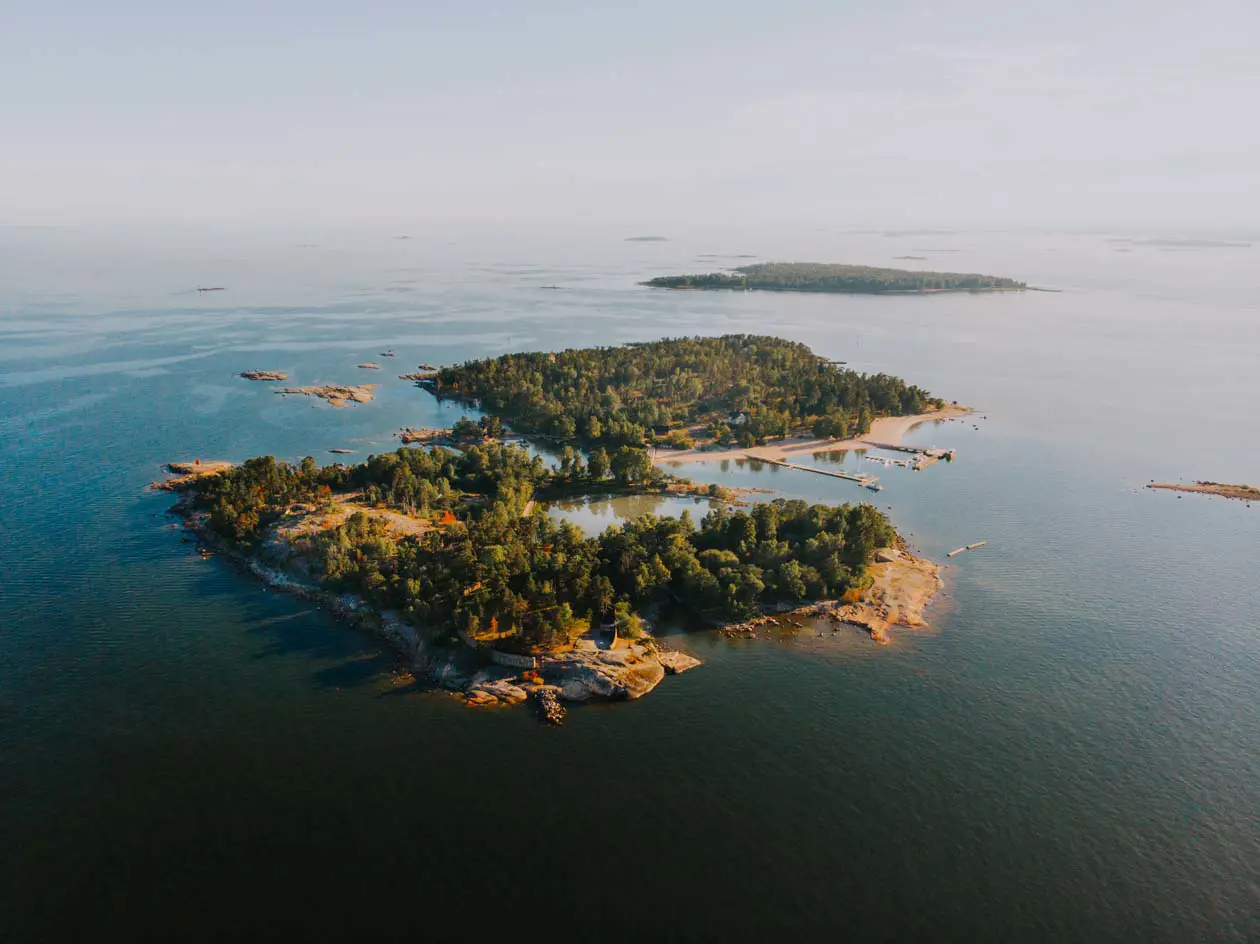
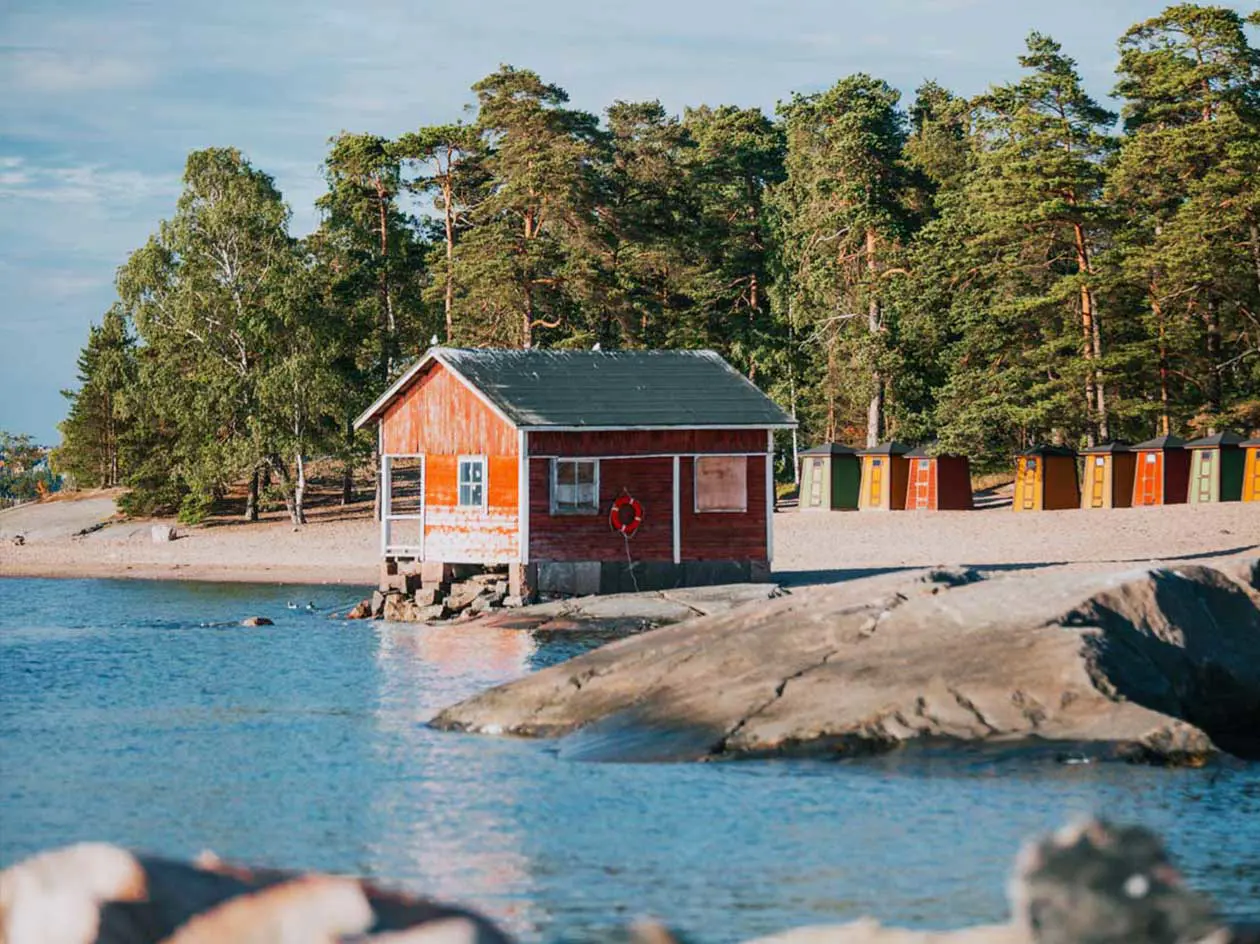
In addition to swimming, visitors can enjoy a 2 km nature trail, picnic areas, a camping site, a marina for leisure boats, and a seaside restaurant. During summer, it’s easily reachable by seasonal ferries from Ruoholahti or the Merisatama piers in the Ullanlinna district.
Lauttasaari Island
Known as the “Island of Happiness,” Lauttasaari is a green, maritime neighbourhoods just ten minutes by metro from central Helsinki. Its Kasinoranta Beach, nicknamed “Casino Beach” by locals, is the hub of summer life, perfect for outdoor enthusiasts. It offers beach volleyball and basketball courts, kite surfing, padel, fitness centers, dance and yoga studios, and a well-equipped skatepark.
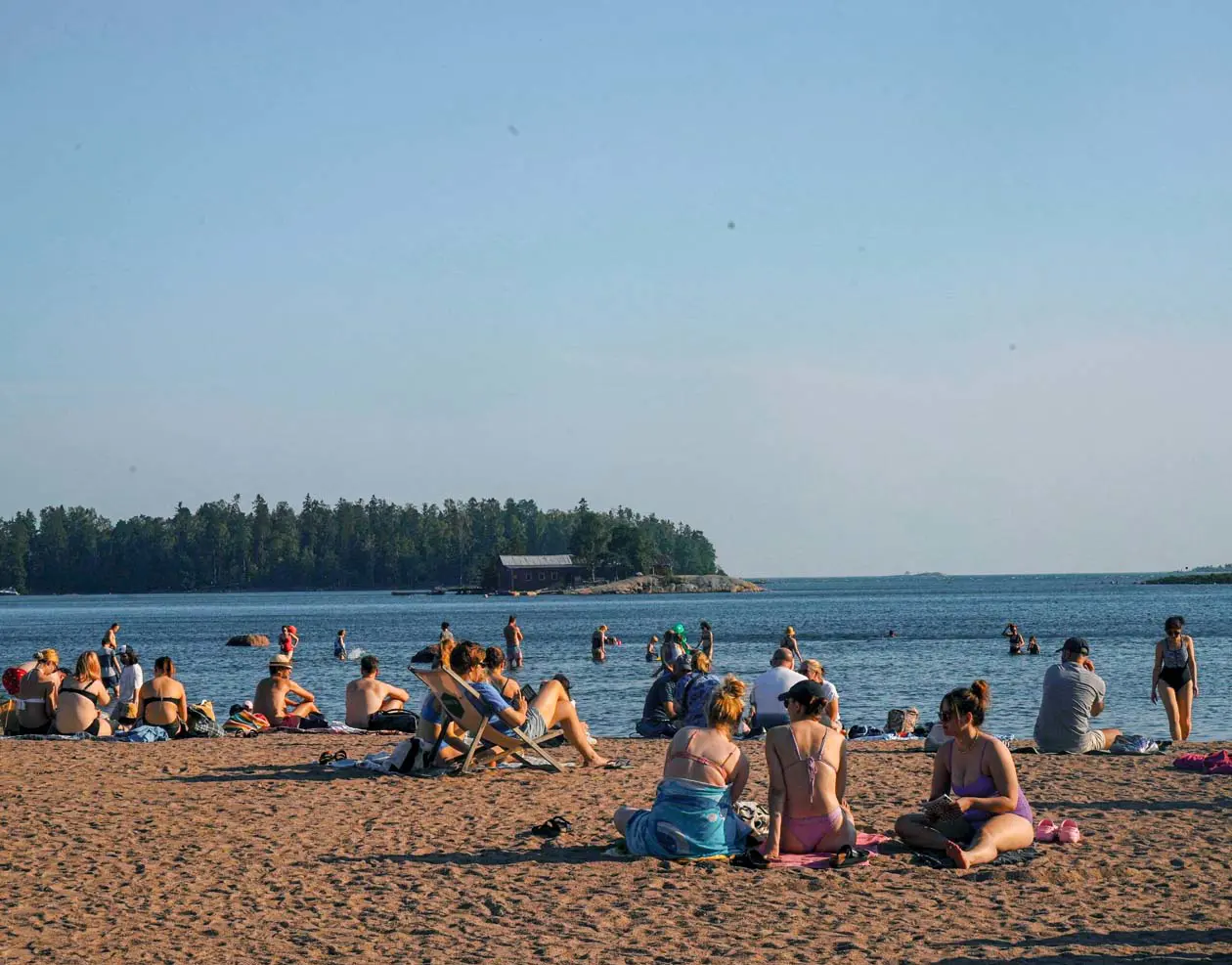
From the shore, you’ll enjoy panoramic views, and during low tide you can walk out to Sisä-Hattu, a small rocky islet perfect for quiet picnics. The area also features beachside bars and restaurants, ideal for sunset dining with views over the Lauttasaari coast. Panoramic trails and green spaces make it a perfect place for walks and quiet moments in nature.
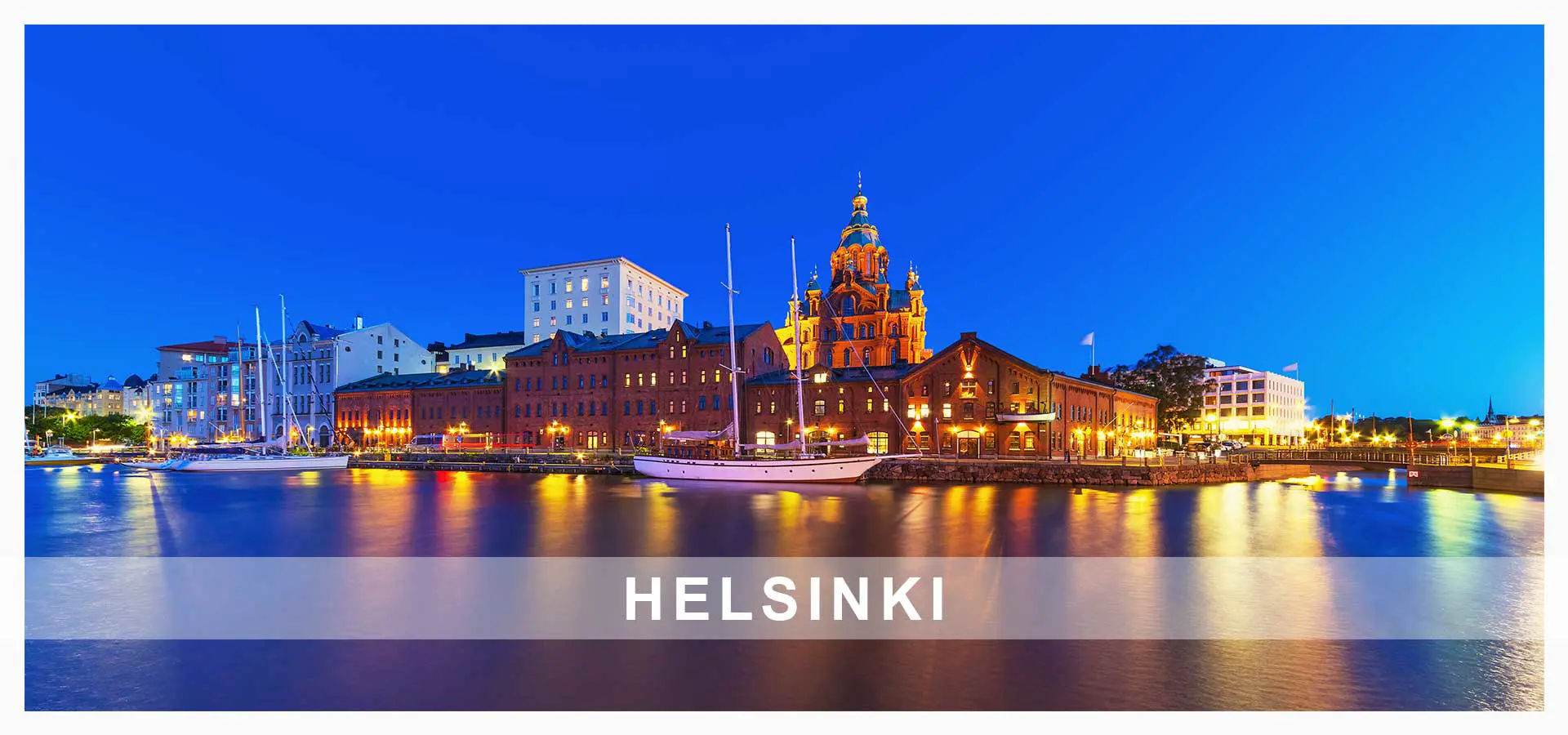
Partnership with Tiqets

DAKAR TO EXPERIENCE
Authentic encounters in the capital of Senegal
Text by Enzo Cuppatri
Perched on the Atlantic Ocean at the westernmost tip of the African continent, Dakar is a city that surprises and captivates, a cultural crossroads where African authenticity meets modern dynamism, offering travellers a journey filled with contrasts and inspiration.
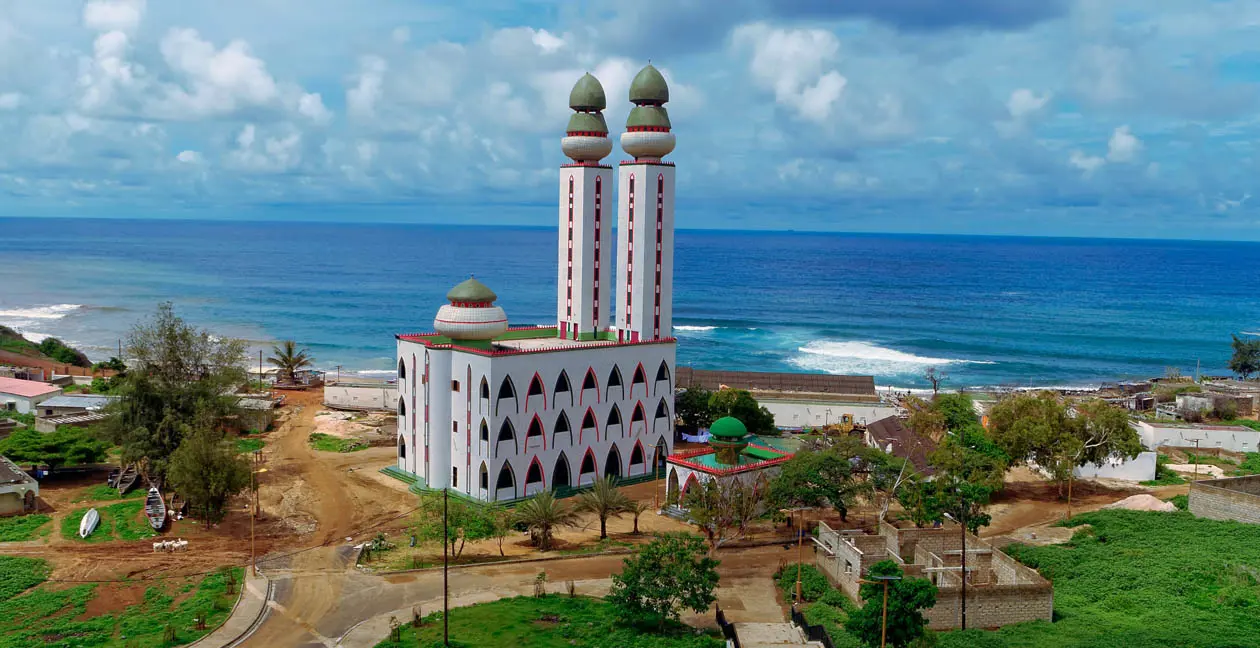
Dakar proudly preserves its historical roots, clearly visible in its most iconic places of worship. The Great Mosque of Dakar, with its towering 67-meter minaret, is among the most important in the country. The Mosque of Massalikul Jinaan, in the Colobane district, stands out for its graceful architecture. Just as striking is the Mosque of the Divinity, perched directly on the Atlantic Ocean in the coastal Lebou village of Ouakam - one of Senegal’s most atmospheric places of worship. Also worth visiting is the Cathedral of Dakar, located in the central Dakar-Plateau district. Art is everywhere in the city - from the National Gallery of Art, dedicated to visual arts, to Dakar’s many museums, such as the Léopold Sédar Senghor House-Museum, once the residence of Senegal’s first president.
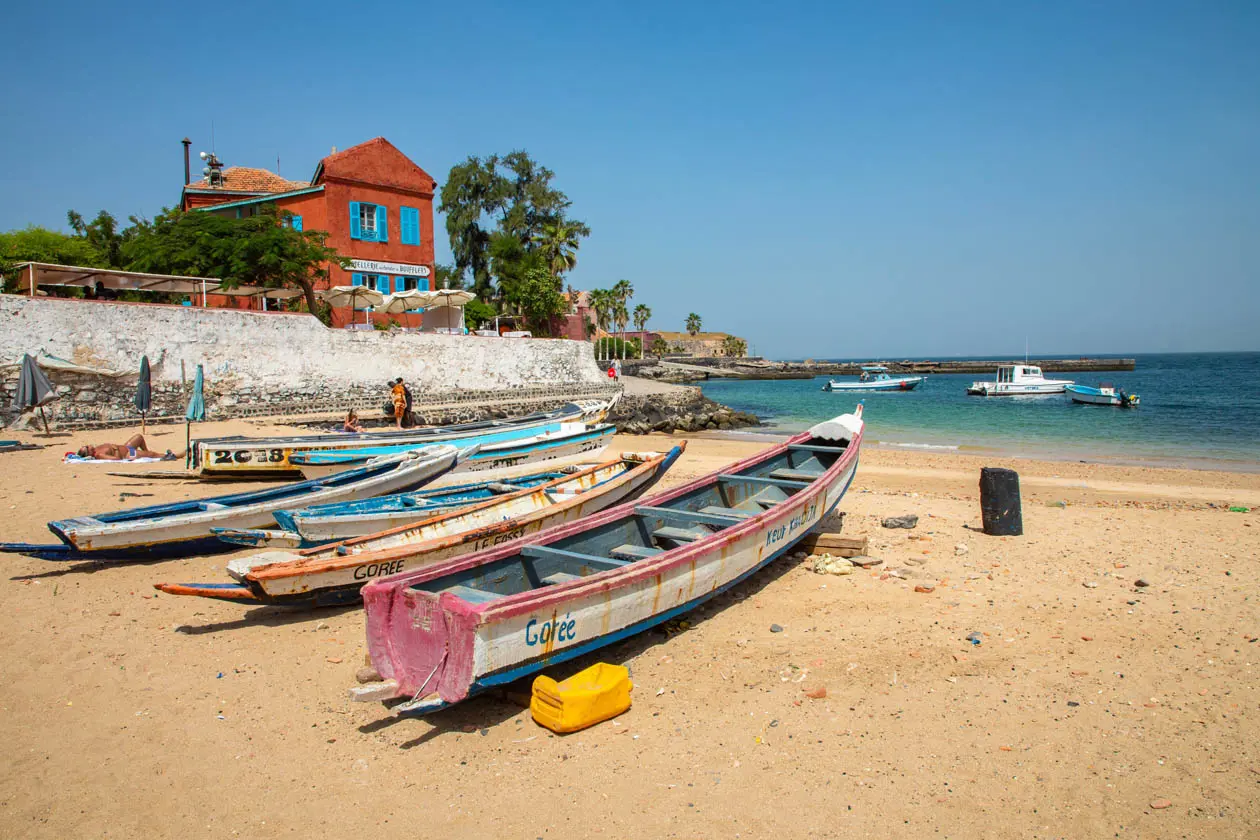
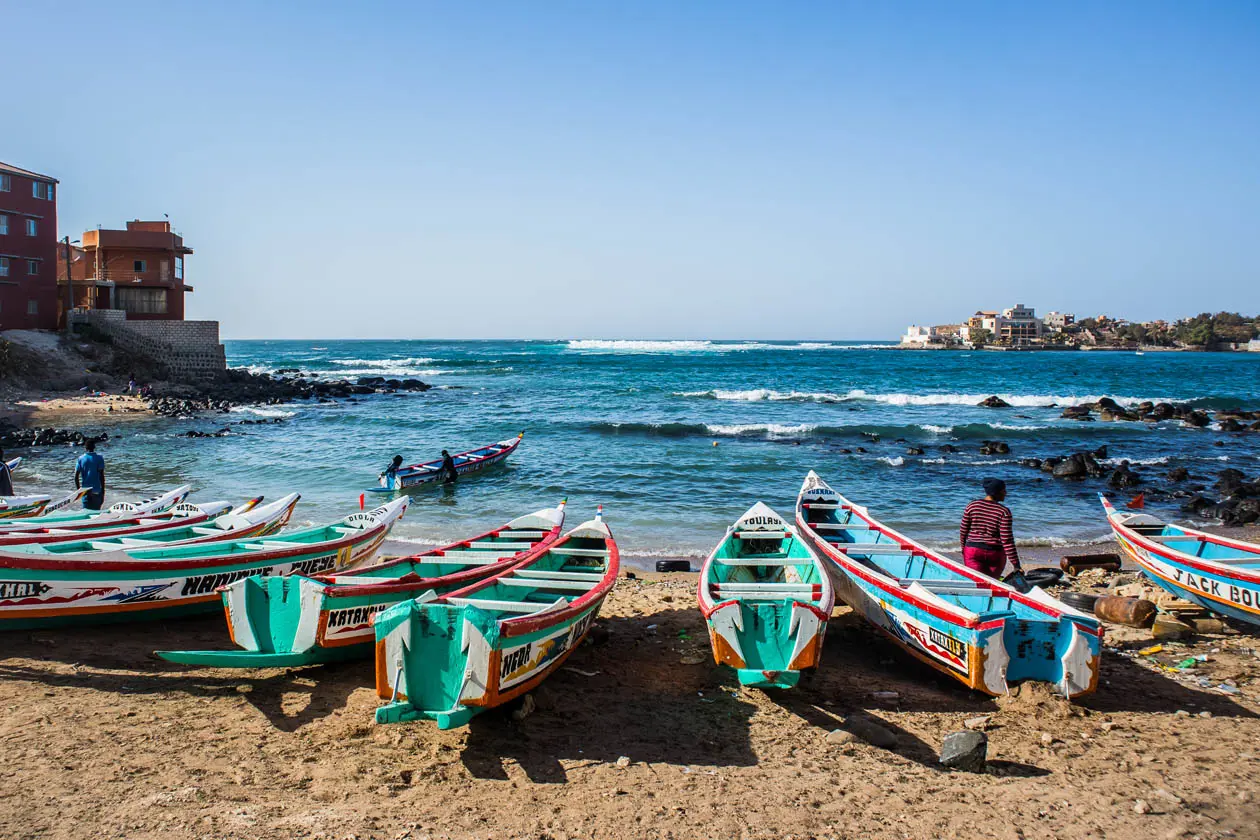
Equally captivating is Dakar’s coastline, with its long stretches of golden sand and rolling Atlantic waves. Urban beaches such as Madeleine and Anse Bernard, or the wild Plage de N'Gor, are ideal for basking in the African sun or practicing water sports like surfing, deep-sea fishing, diving - or exploring the calm nearby islands, such as the Îles de la Madeleine or the historic Île de Gorée.
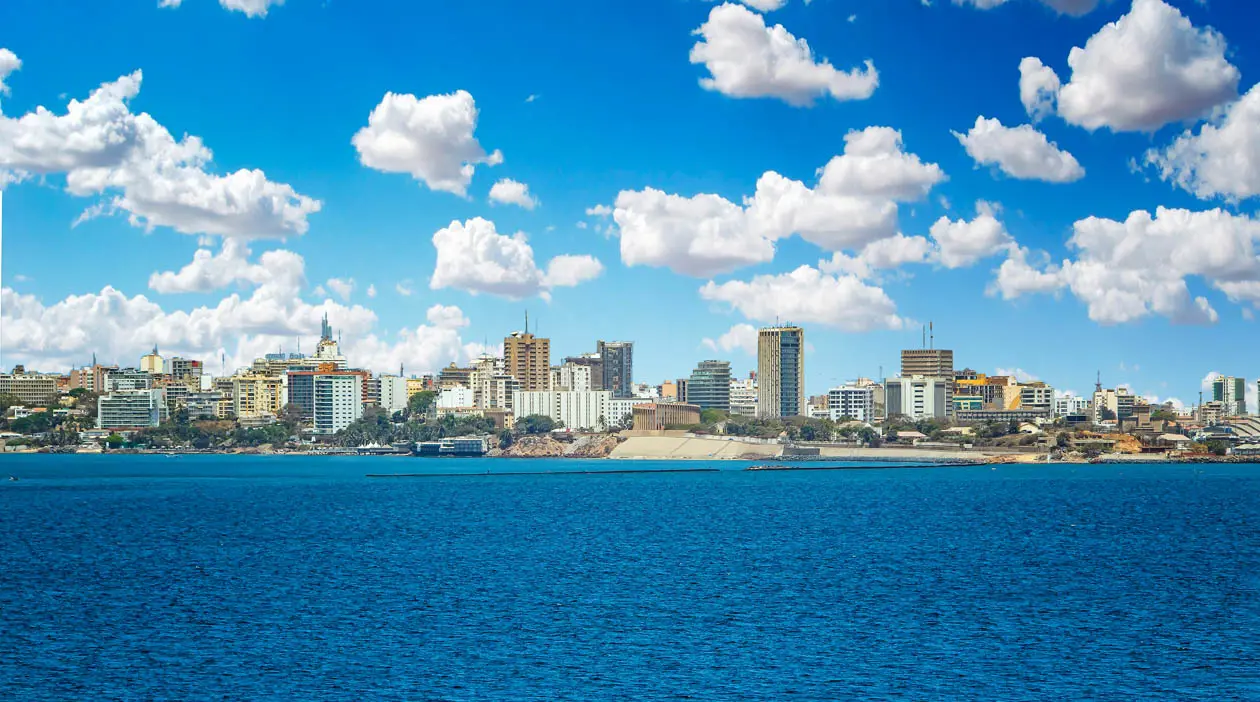
The city stimulates all the senses with its vibrant colors, infectious energy, and the warmth of its people. From bustling markets and traditional fishing villages like Ngor Island, reached by canoe, to Dakar’s lively nightlife - this destination delivers genuine emotion at every turn. Here are some suggestions to help you experience the very best of Senegal’s capital.
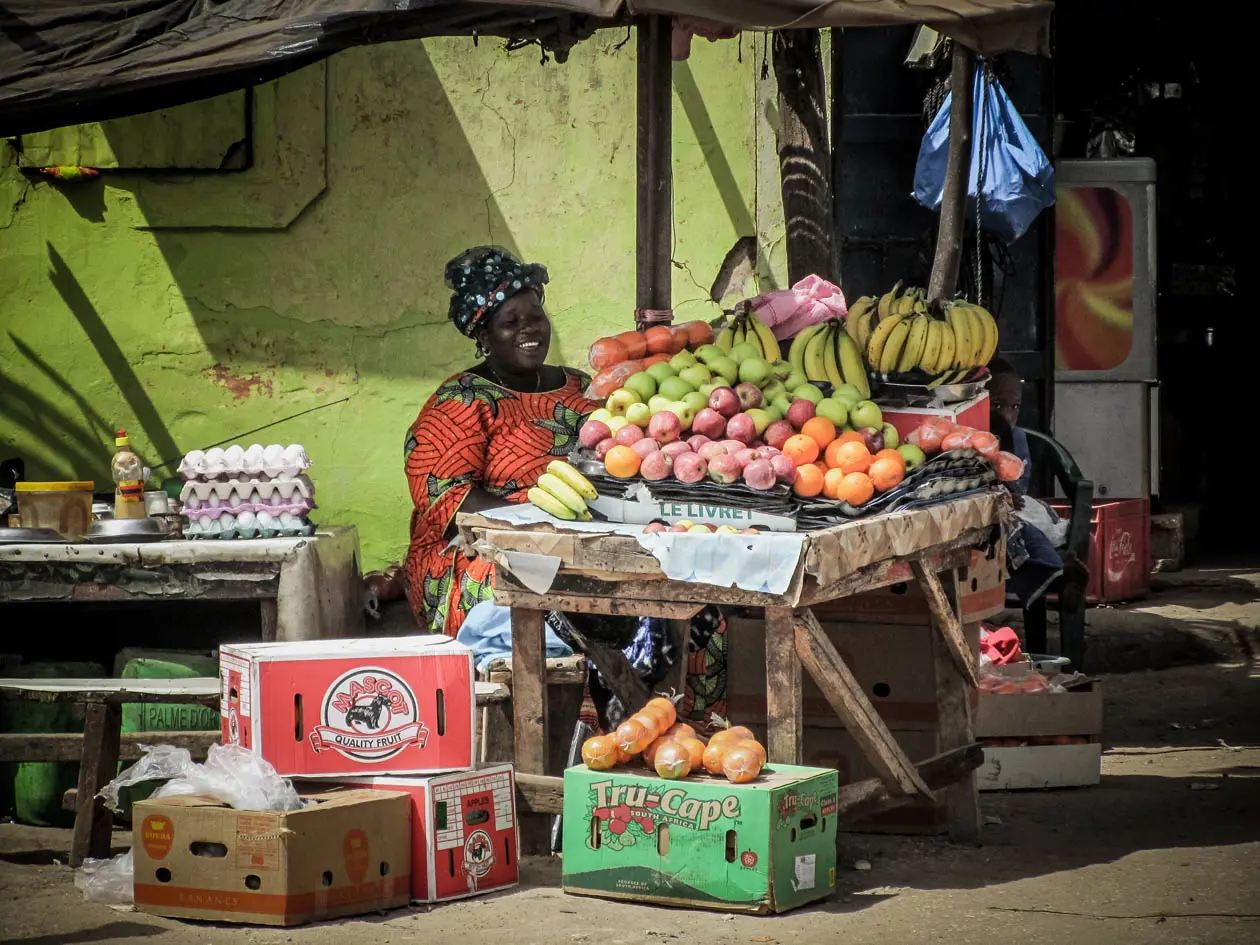
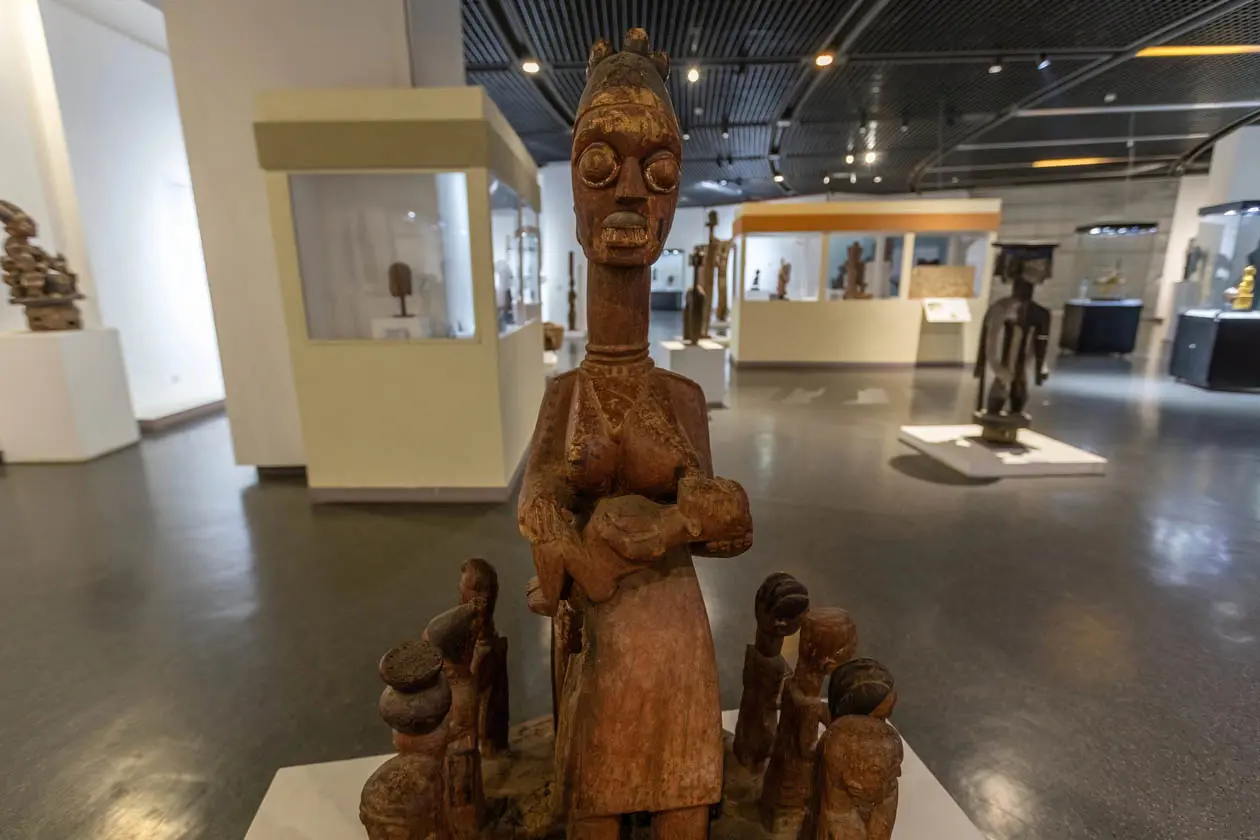
Dive into Dakar’s artistic soul
For art lovers, the IFAN Museum of African Arts, one of West Africa’s oldest, houses artifacts from across the continent, offering a deep dive into the richness of African artistic expression. The Museum of Black Civilizations is another must-see: it celebrates the cultural and historical heritage of Africa and traces a journey from prehistory to contemporary art, highlighting the contribution of Black civilizations to global culture.
Climb to the top of the African Renaissance Monument
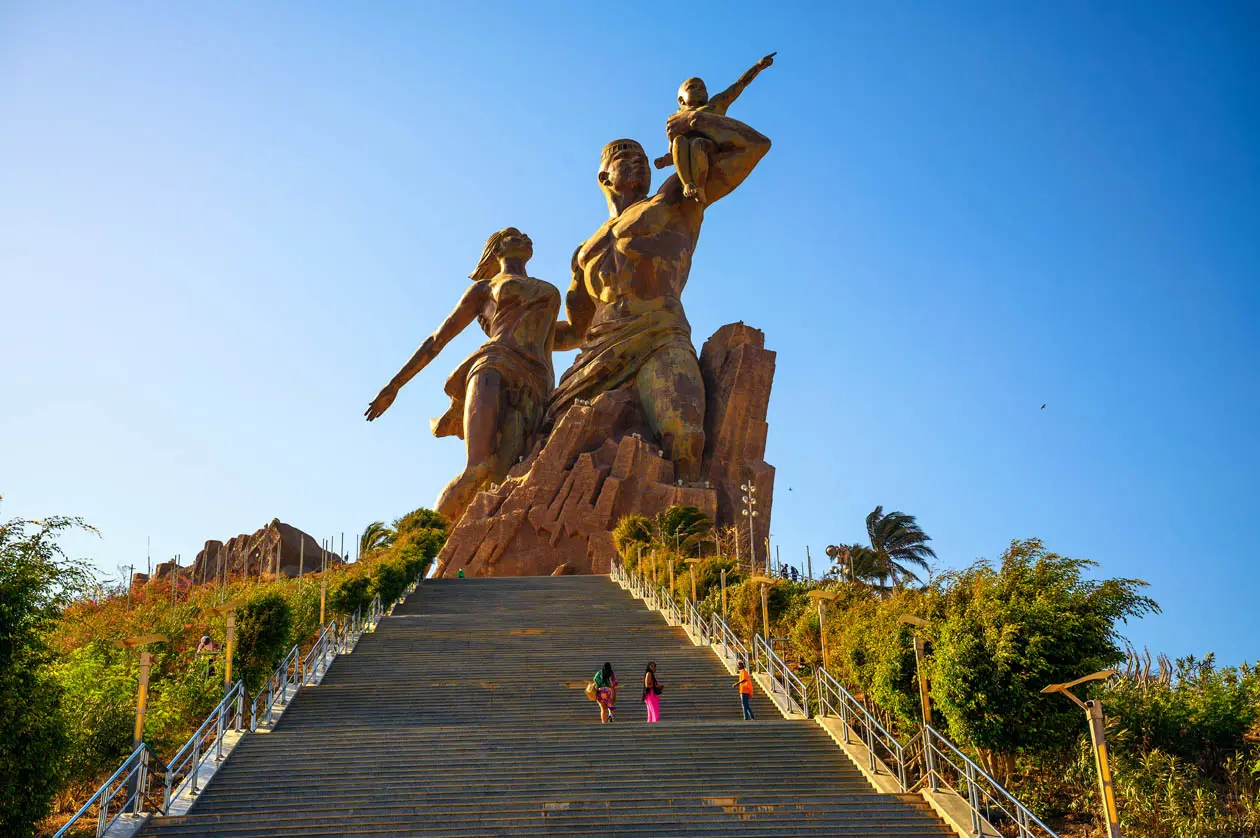
Towering over Dakar at 52 meters high, the African Renaissance Monument is the tallest statue in Africa, crafted from bronze and copper. Located on one of the Mamelles hills, it depicts a man, woman, and child looking confidently toward the future. After ascending 198 steps to the monument’s base, visitors can take an elevator to the top for breathtaking panoramic views over the city and the ocean.
A music-filled evening
at the Mamelles lighthouse
Built in 1864, the Mamelles Lighthouse stands atop the volcanic hills of Les Mamelles and is the city’s oldest. While offering sweeping views by day, it becomes particularly magical at night, its white light beam stretching up to 53 kilometers across the Cape Verde Peninsula. A bar and restaurant onsite host live music evenings in an atmospheric and exclusive setting.
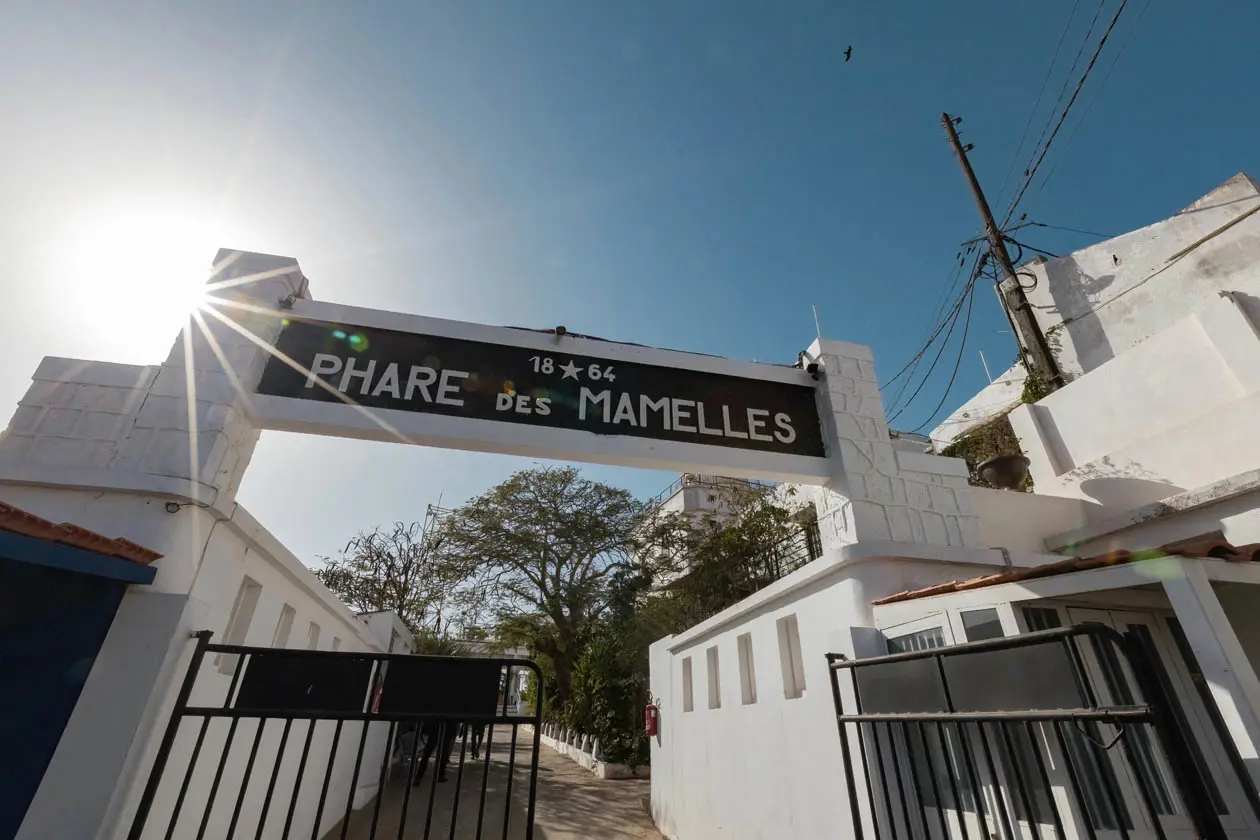
Explore l'Île de Gorée
Among Dakar’s many islands, Gorée Island is a must-see for a full-day visit. Listed as a UNESCO World Heritage Site, it was once a hub of the transatlantic slave trade and now houses the Historical Museum of Senegal inside Fort d'Estrées.
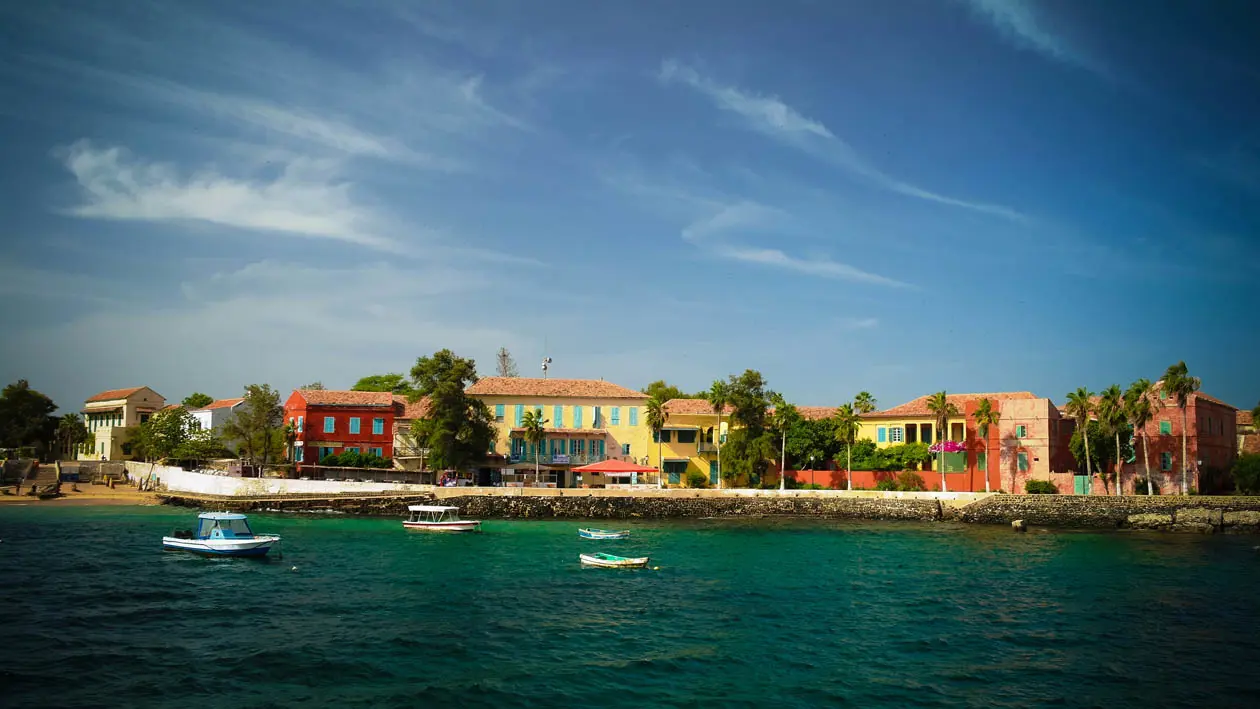
Wandering its cobbled streets, visitors encounter beautifully preserved colonial buildings and a poignant atmosphere imbued with memory and poetic charm.

Visit the Turtle Village
In Sangalkam village, just outside Dakar, you’ll find the Turtle Village, home to various turtle species, including the giant African spurred tortoise, which can weigh up to 100 kg. Visitors can observe turtle mating and hatching, or even learn how to repair cracked shells. It’s a unique opportunity to connect with Senegal’s biodiversity in a hands-on, immersive way.
Excursion around Dakar to the Pink Lake
About 40 km from Dakar lies Lake Retba, also known as the Pink Lake, a lagoon framed by dunes and filao trees. Its shimmering pink hue is caused by a salt-loving algae that thrives under sunlight.
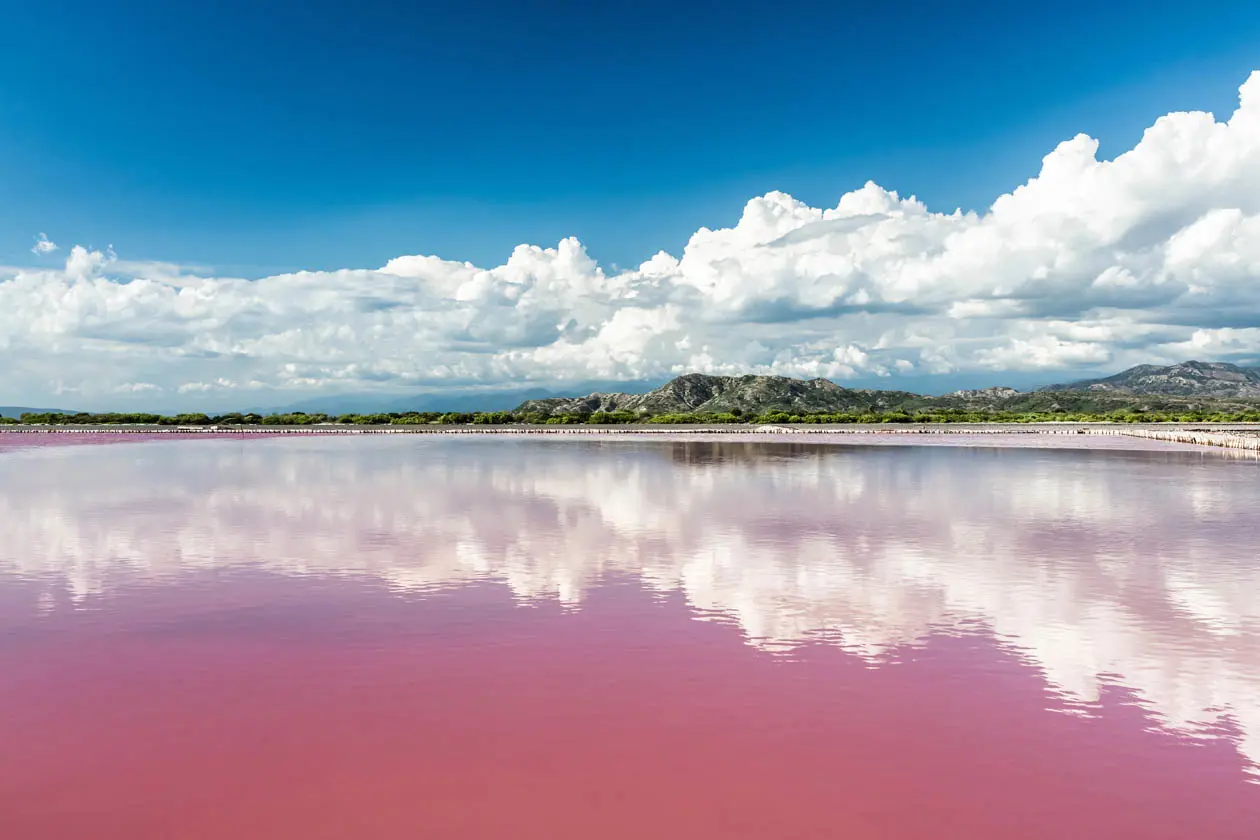
Once the legendary final stage of the Paris-Dakar Rally, the area is ideal for quad biking, horseback or camel rides, and relaxing by the water. Don’t miss the salt collectors’ museum, which offers insight into the region’s unique relationship with salt harvesting.
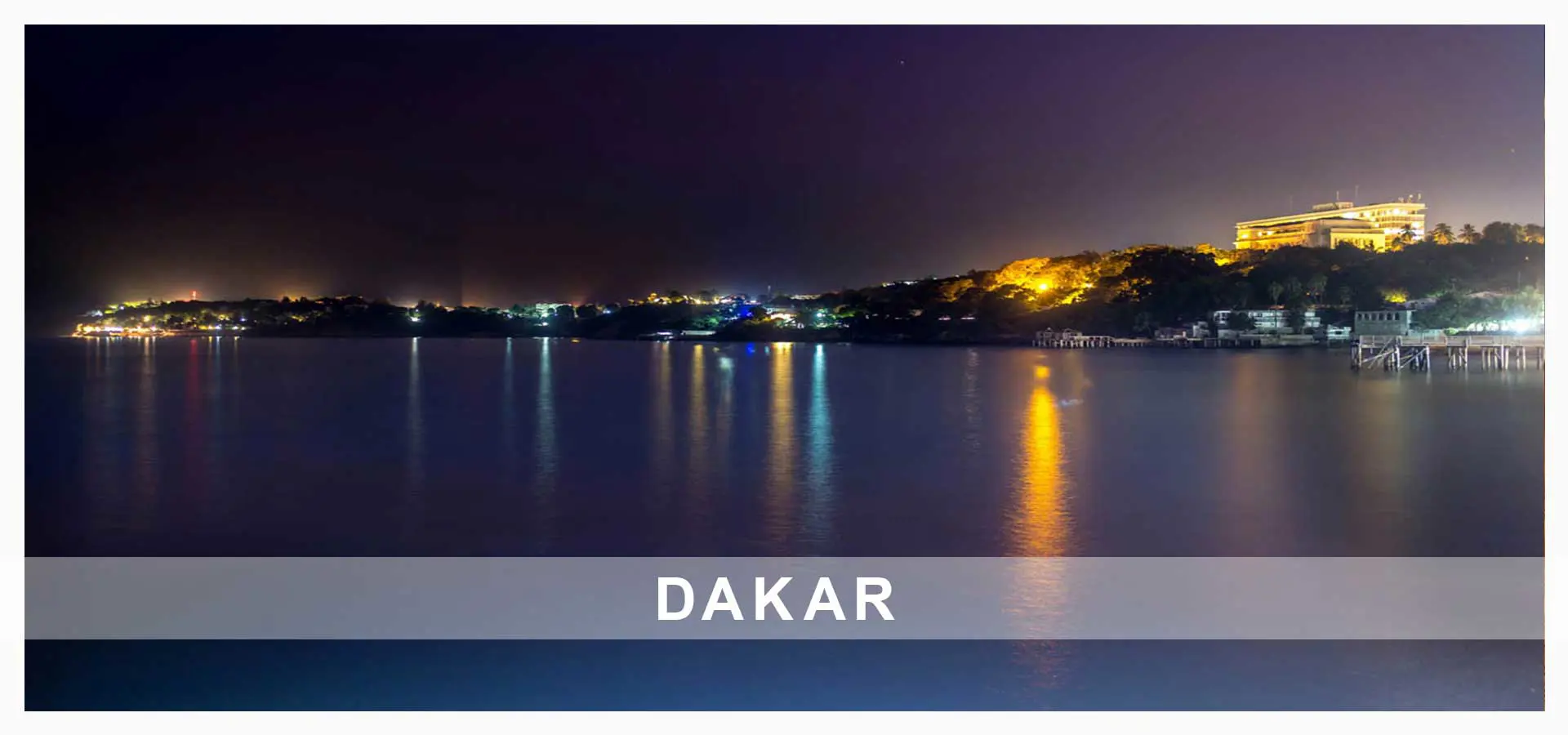
Partnership with Booking.com

A JOURNEY INTO THE HEART OF COPENHAGEN
Between fairy-tale canals, royal castles, and design districts:
a guide to the wonders of Denmark’s capital
Text by Lisa Maria River
Copenhagen, the capital of Denmark, is one of the most sought-after destinations for travellers exploring the Nordic countries. Known for its sustainable lifestyle and its reputation as the Qeen of the bicycle, the city rises between serene freshwater canals and the Baltic Sea, embodying the elegance of a vibrant, human-scaled metropolis.
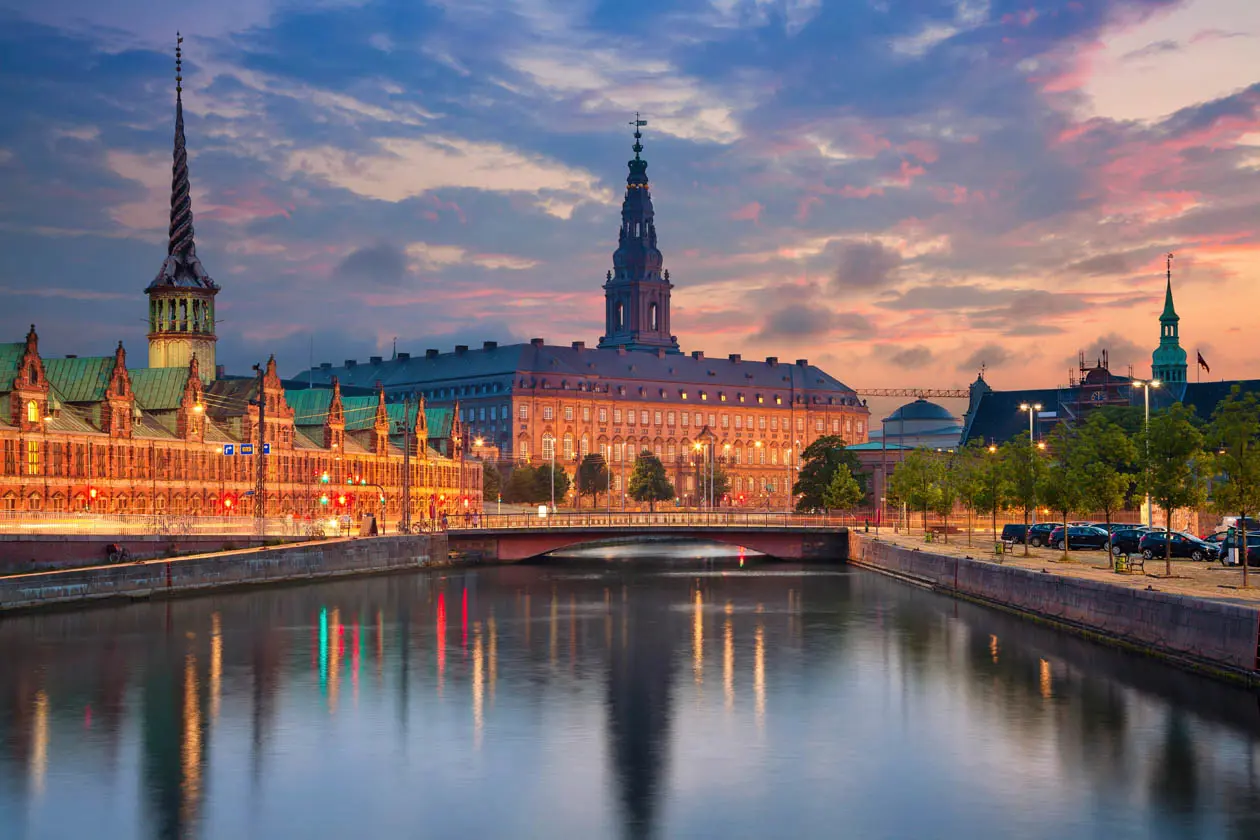
In this city, the charm of history blends seamlessly with a bold, forward-thinking spirit. Striking contemporary architecture coexists with character-rich historic neighbourhoods, each with its own identity and unique story to tell. What makes Copenhagen so captivating is its multifaceted, ever-evolving soul - offering an itinerary filled with diverse experiences: from art and architecture to Renaissance castles and ancient palaces, from museums to cutting-edge galleries, from cultural events to open-air shopping, all set against a backdrop of scenic streets best discovered on foot or by bicycle - just like the locals do.
UNMISSABLE ATTRACTIONS IN COPENHAGEN
SMK - The National Gallery of Denmark
Located near Nørreport Station, in the leafy heart of Copenhagen, the Statens Museum for Kunst (SMK) is Denmark’s National Gallery and a captivating dialogue between Danish and international art. Spanning centuries - from European Renaissance masters to modern and contemporary art - the museum offers an immersive journey through visual creativity.
Among the highlights are masterpieces by Abramović, Anna Ancher, Danh Vo, Derain, Elmgreen & Dragset, Hammershøi, Mantegna, Munch, Nolde, and Rubens. Don't miss the collection dedicated to the Golden Age of Danish Art, and the refined section exploring the creative world of Henri Matisse.
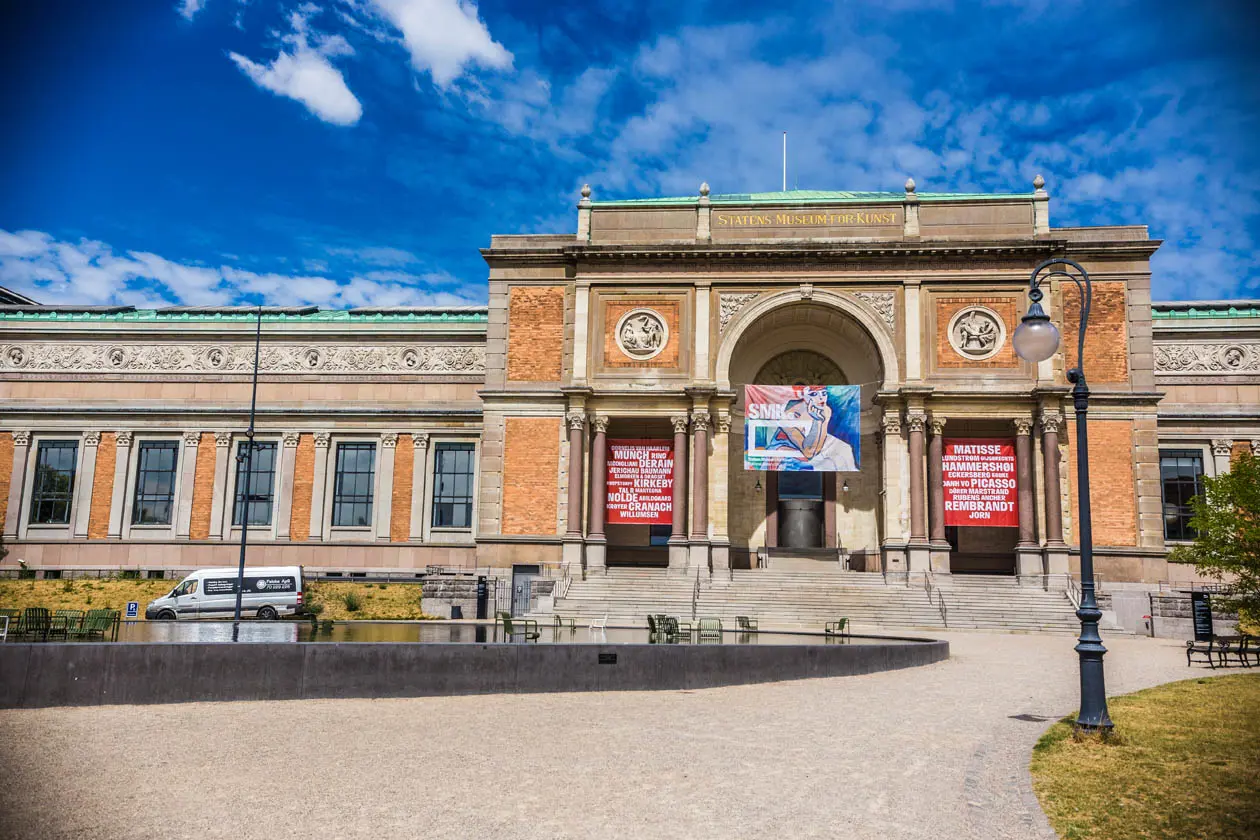
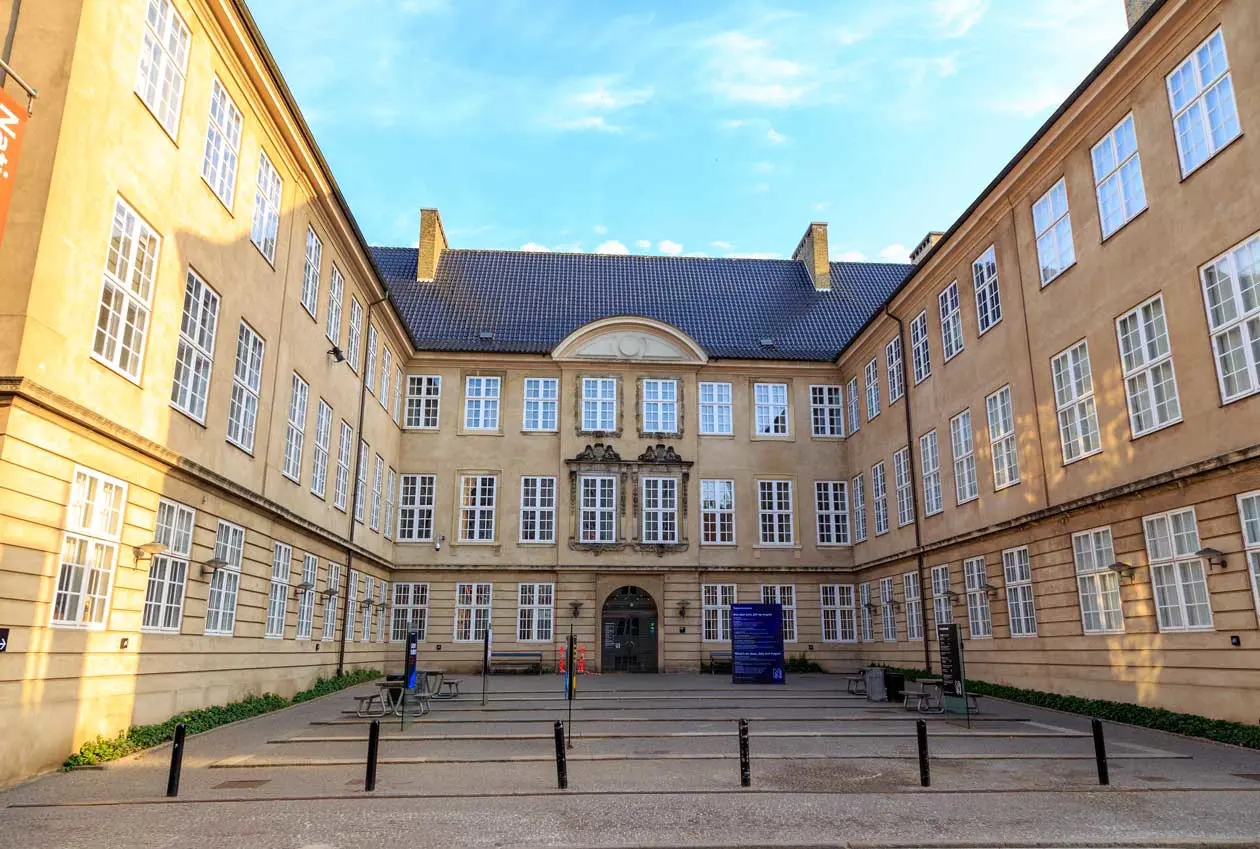
The National Museum of Denmark
Housed in the elegant 18th-century Prince's Palace, designed by royal architect Nicolai Eigtved (1743-1744), the National Museum of Denmark is the country’s leading historical museum. Its collections span eras, civilizations, and continents: from legendary Viking treasures to the Bronze Age Egtved Girl’s tomb, from Egyptian mummies to Renaissance art, as well as objects telling the story of everyday Danish life through the ages.
Iconic items include the Sun Chariot, a powerful symbol of Nordic cosmology, a prestigious coin and medal collection, and a charming toy museum. The museum also features a café, shop, and a restaurant serving Danish specialties, including the iconic smørrebrød, the traditional open-faced sandwich.
The Marble Church
The Marble Church, or Frederikskirken, is one of Copenhagen’s most stunning religious landmarks. Located in the Frederiksstaden district, it is perfectly aligned with Amalienborg Palace and the Opera House, embodying the city’s neoclassical urban vision. Construction began in 1749, designed by Nicolai Eigtved, but remained incomplete for over a century. The grand green dome, inspired by St. Peter’s Basilica in Rome, dominates the skyline.
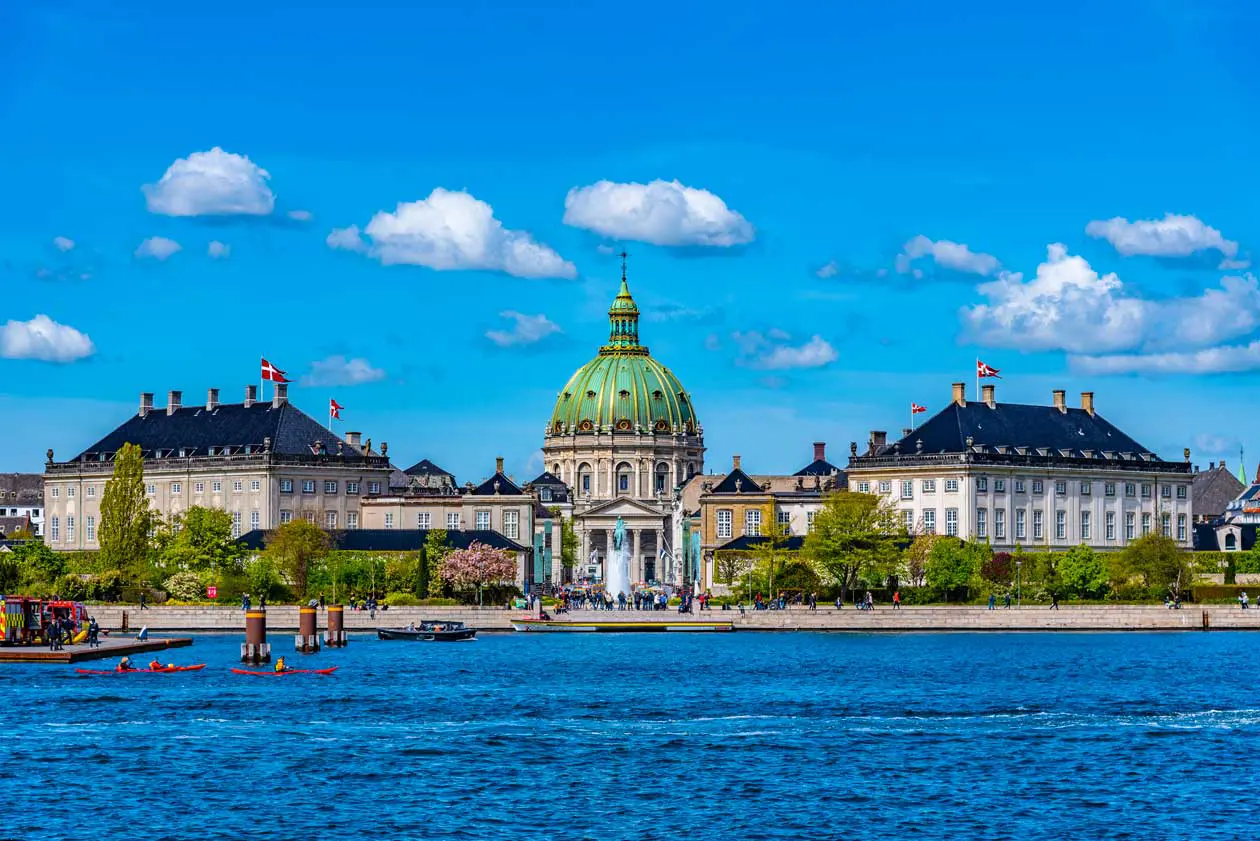
Thanks to architect Ferdinand Meldahl, the church was completed in 1894, preserving its original Neo-Baroque style. Visitors can climb to the top of the verdigris copper dome for panoramic views of the city. Nearby are Amalienborg Palace, its museum, and monumental square, while a pleasant seaside stroll leads to the Little Mermaid statue and the Langelinie promenade.
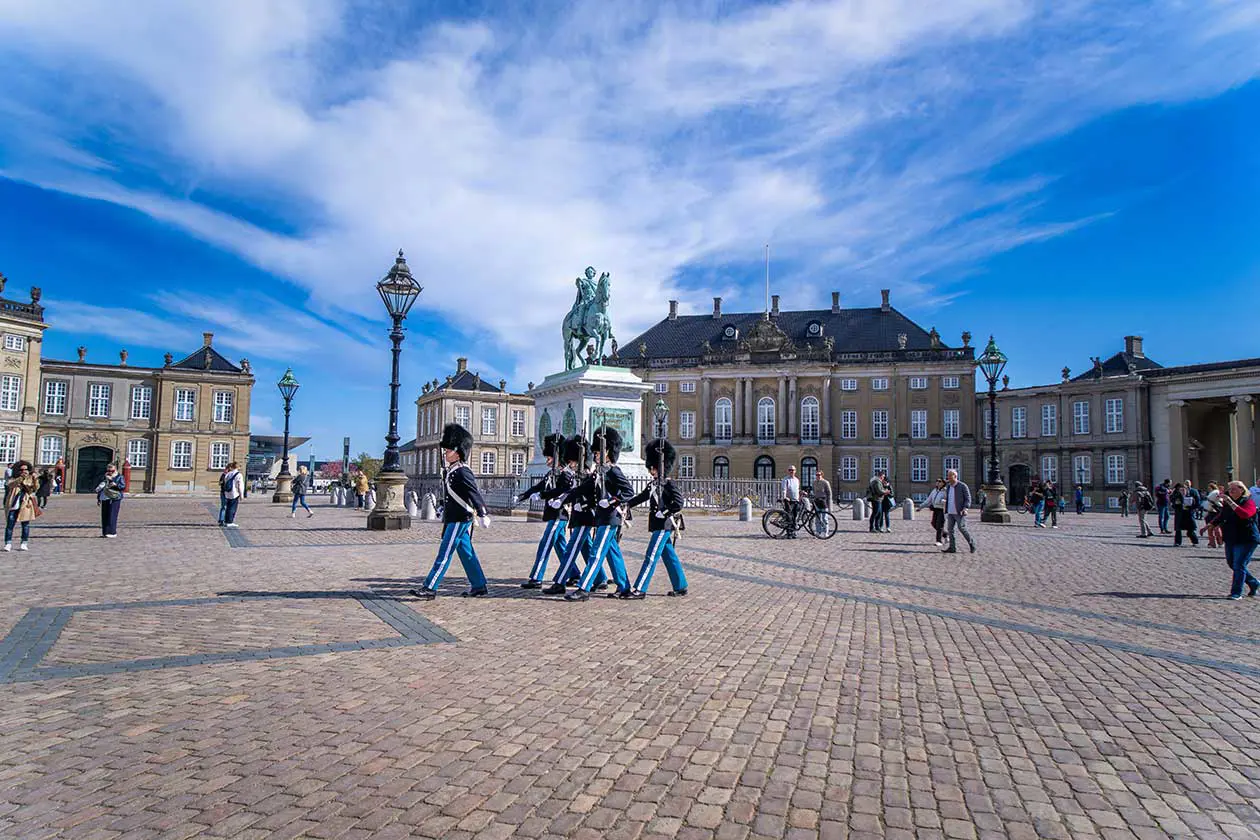
Amalienborg Palace
Amalienborg Palace, in the heart of Copenhagen, is the main residence of the Danish Royal Family and a symbol of one of the world’s oldest monarchies. The Rococo-style architectural complex consists of four identical palaces arranged around an octagonal square dominated by an equestrian statue of King Frederik V.
Each palace serves a unique function: Christian VII’s Palace hosts official guests; Frederik VIII’s Palace is home to His Majesty King Frederik X, Queen Mary, and their children; Christian IX’s Palace houses Queen Margrethe II; Christian VIII’s Palace contains the Amalienborg Museum, offering a fascinating look at royal history through restored rooms, portraits, personal items, and courtly curiosities. Don’t miss the changing of the guard ceremony, held daily at noon - an elegant and solemn tradition.
Christiansborg Palace
Once a royal residence, Christiansborg Palace, on Slotsholmen Island in central Copenhagen, now houses the Danish Parliament, Supreme Court, and Prime Minister’s Office.
Visitors can tour the lavish Royal Reception Rooms, including the Tower Room, Oval Throne Room, and the dazzling Great Hall, adorned with monumental tapestries commissioned for Queen Margrethe II’s 50th birthday, depicting over a thousand years of Danish history.
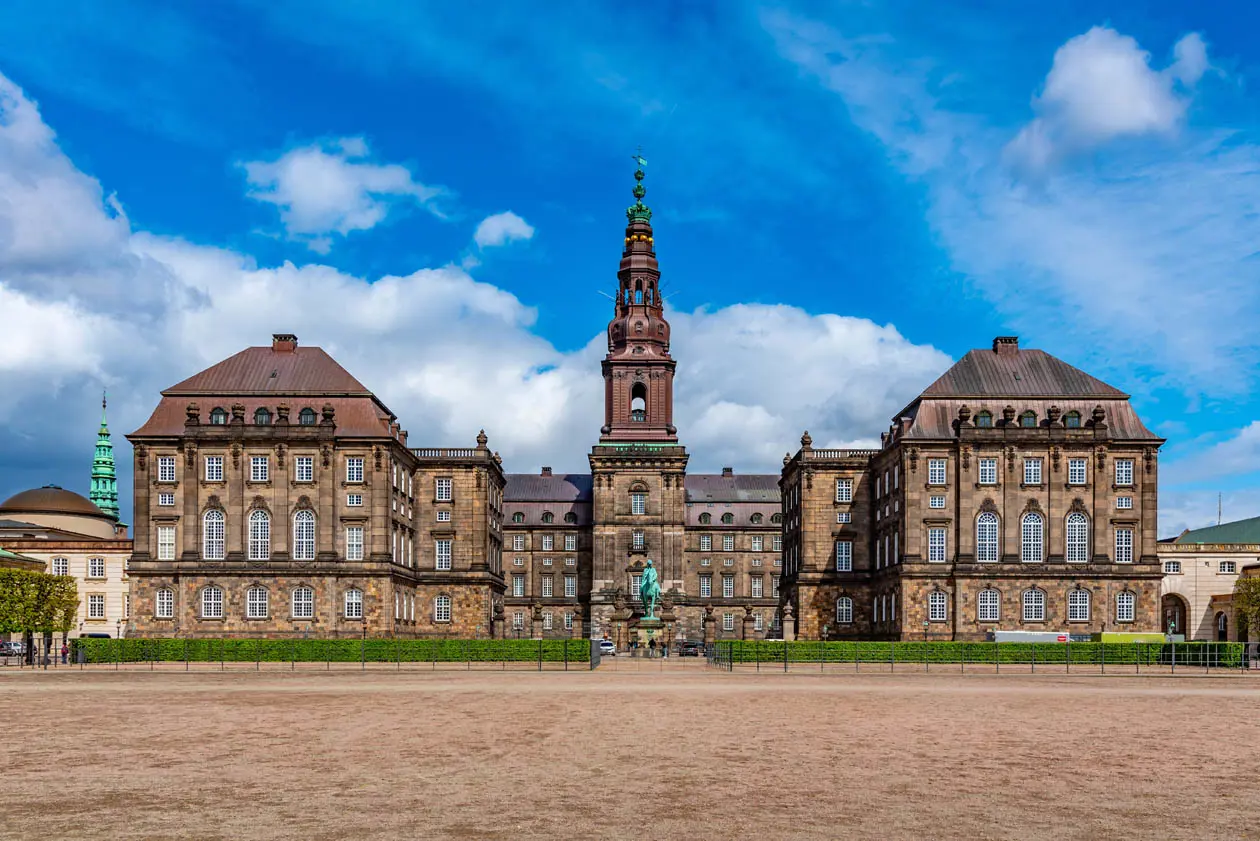
In the palace's underground, explore ancient ruins, a medieval wall, and the historic royal kitchens, a glimpse into courtly life of the past.
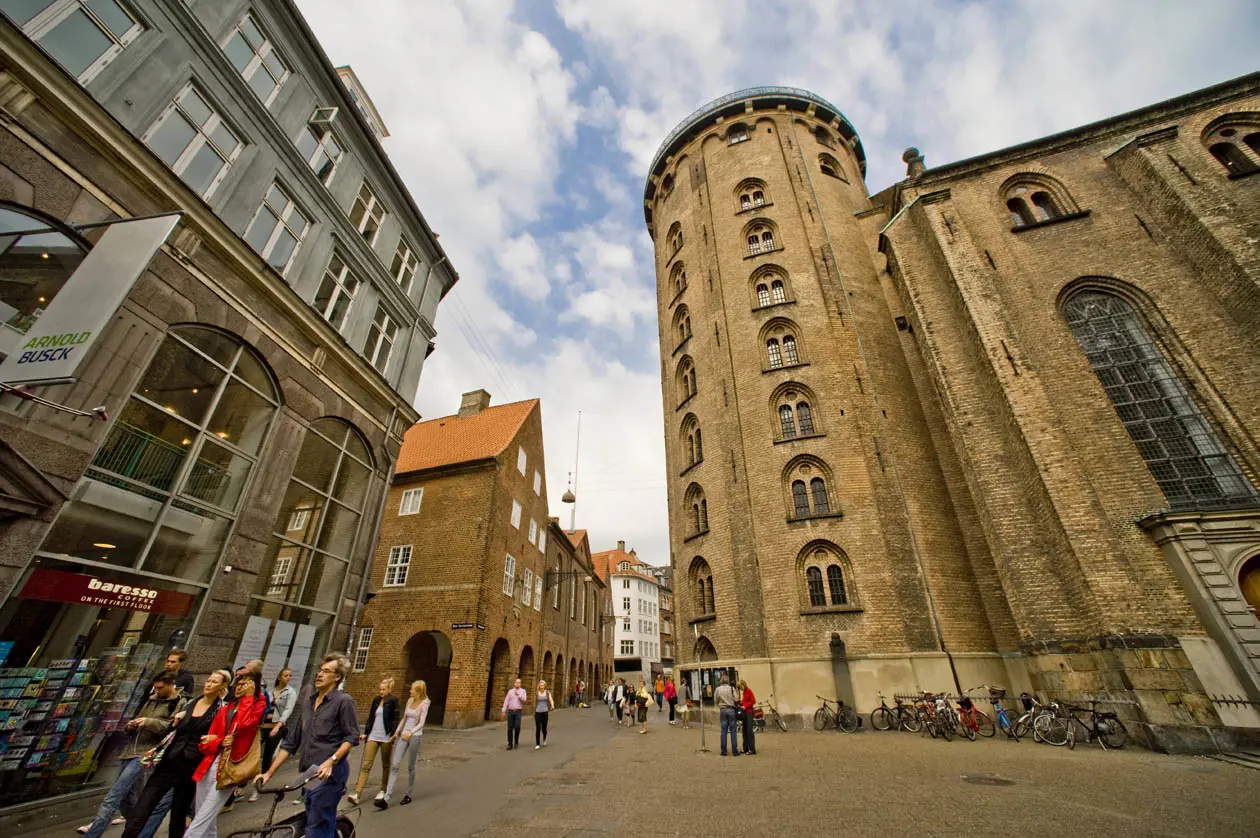
The Round Tower
A symbol of Copenhagen, the Round Tower (Rundetårn), completed in 1642 under King Christian IV, was built to house the University of Copenhagen’s first astronomical observatory. Nearly four centuries later, it remains Europe’s oldest functioning observatory. Located in the historic city center, the tower features a unique 200-meter spiral ramp winding inside the structure.
Climbing to the top rewards visitors with 360-degree views over the city and access to the observatory.
Midway up is the Library Hall, famously mentioned in Hans Christian Andersen’s tales. Once home to the university library, today it hosts exhibitions, cultural events, concerts, a café, and a bookshop.
Rosenborg Castle
Nestled within the King’s Garden (Kongens Have), Rosenborg Castle is a Renaissance gem built by King Christian IV in the 17th century as a royal residence. Today, it’s one of Copenhagen’s most charming cultural attractions and part of the Parkmuseerne museums network. Inside its elegant halls lie the Danish Crown Jewels and Royal Regalia.
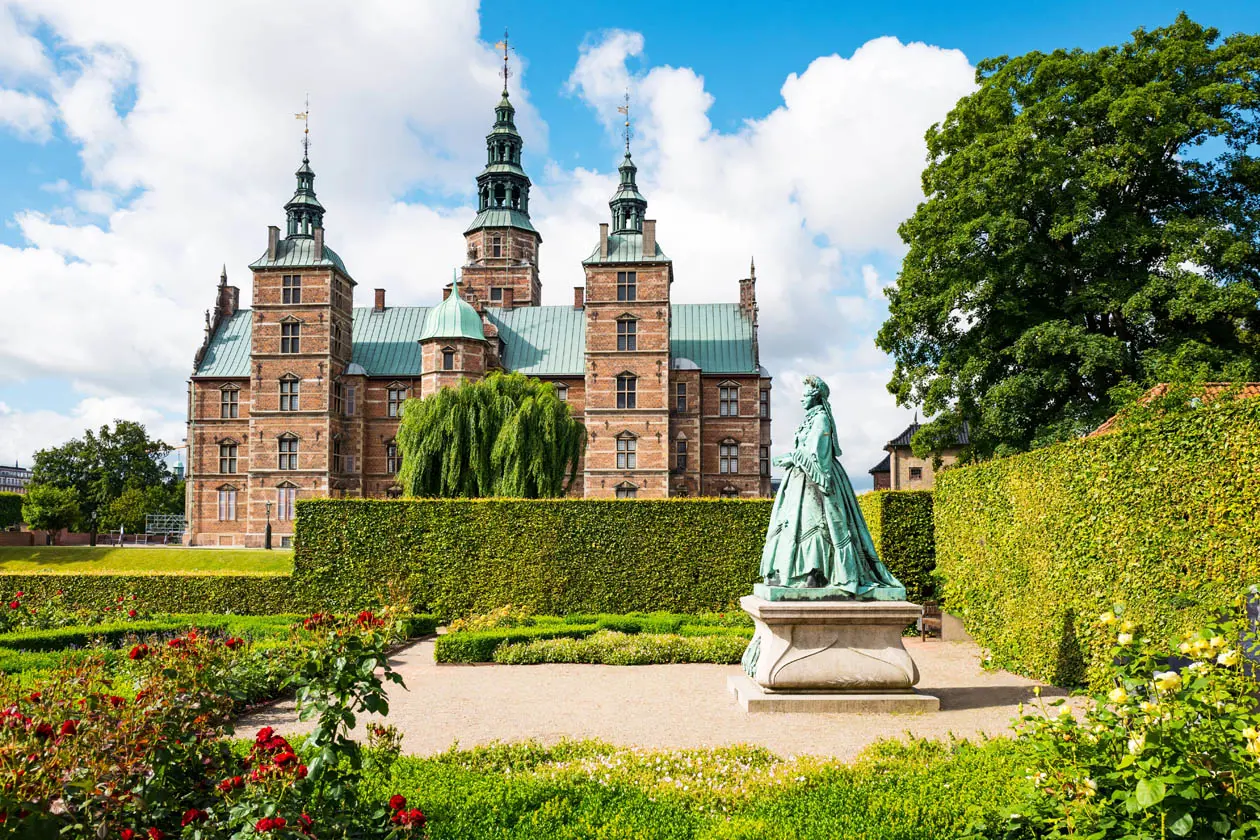
Among the most iconic spaces is the Knights' Hall, with majestic thrones, tapestries, period furnishings, and statues reflecting the splendor of the Danish court. Also on display are Flora Danica porcelain, Venetian glassware, and historic portraits, including Queen Caroline Matilda by Jens Juel (1771) and Johan Friedrich Struensee, painted in 1824 by Hans Hansen based on a Juel original.
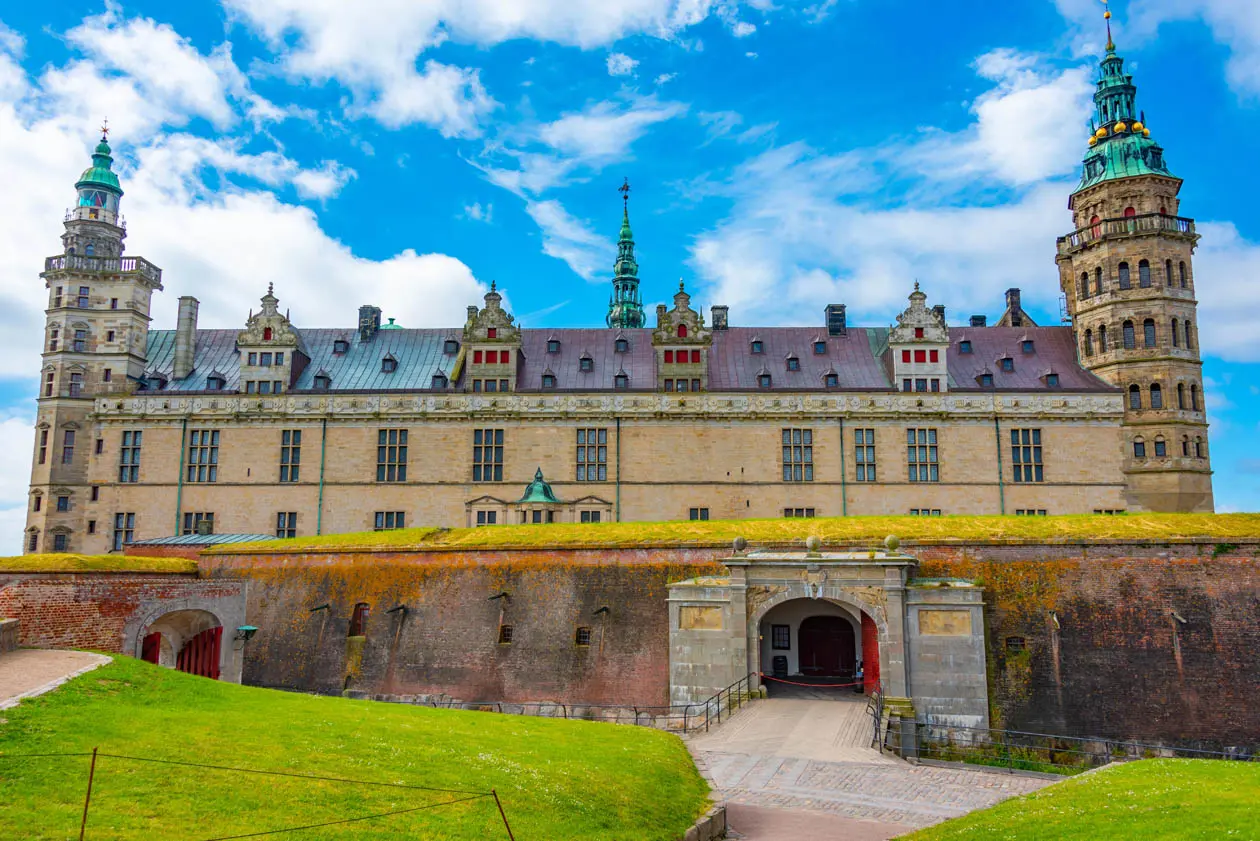
Kronborg Castle
Famous as the setting of Shakespeare’s Hamlet, Kronborg Castle is one of Denmark’s most iconic historic sites and a UNESCO World Heritage Site. Overlooking the Øresund Strait in the town of Helsingør (Elsinore), this fortress has had strategic importance for centuries. The first fortification dates back to the 1420s.
Between 1574 and 1585, King Frederik II transformed it into a Renaissance residence with elegant courtyards and cannon-lined bastions to control maritime trade between the North Sea and the Baltic. After a fire in 1629, Christian IV rebuilt the castle with Baroque enhancements. From 1690, it ceased being a royal residence and served as a military barracks (1785-1923), later restored to its former grandeur. Each August, Kronborg hosts the Shakespeare Festival, turning the castle into a magical open-air stage.
The Little Mermaid
The Little Mermaid is one of Copenhagen’s most beloved icons. This bronze sculpture sits along the harbourfront, depicting the famous fairy tale by Hans Christian Andersen, a mermaid who gives up her underwater world for the chance to live among humans and pursue love.
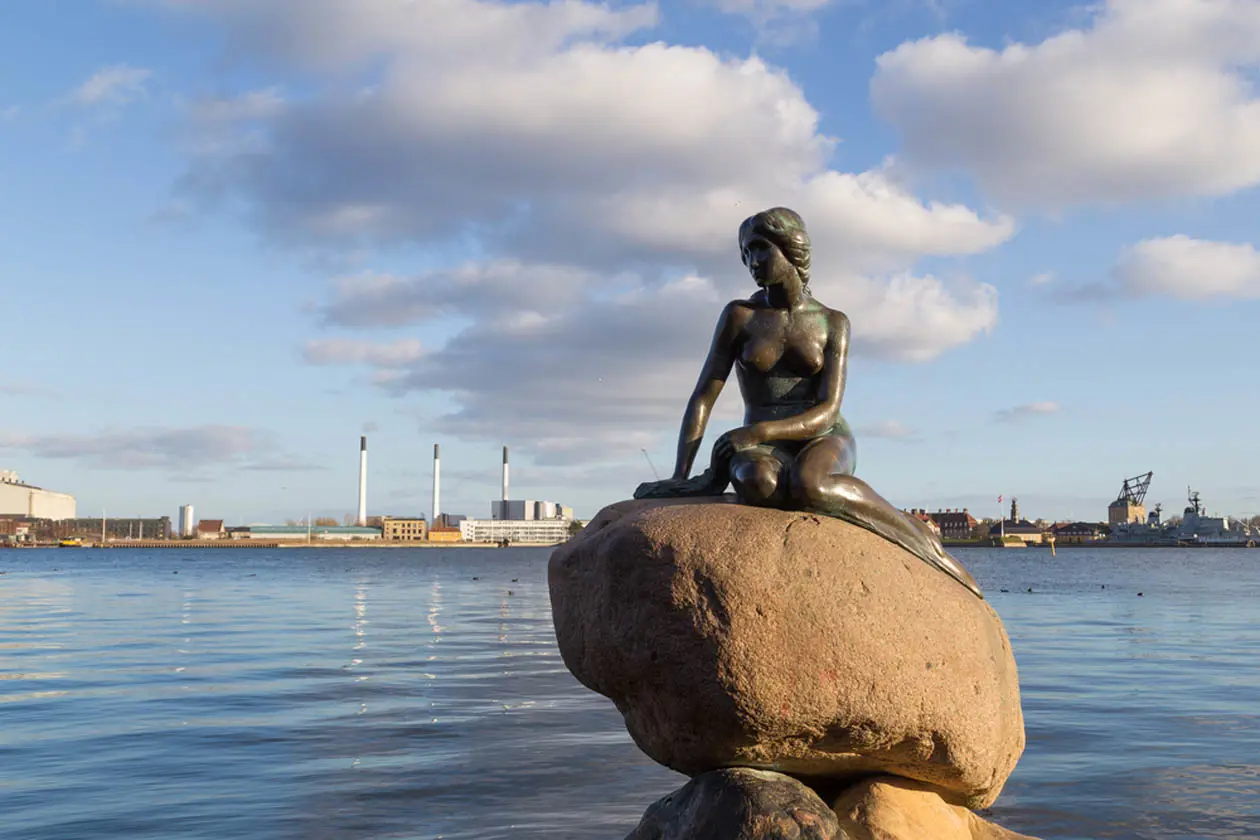
Donated to the city in 1913 by brewer and patron Carl Jacobsen, the statue was sculpted by Edvard Eriksen. While the face was inspired by ballerina Ellen Price, the body was modeled by Eriksen’s wife Eline, as Price declined to pose nude. Perched on a rock gazing toward shore, the statue expresses a subtle mix of melancholy and longing. Though modest in size, it has become a poetic symbol of nostalgia, sacrifice, and unattainable love.
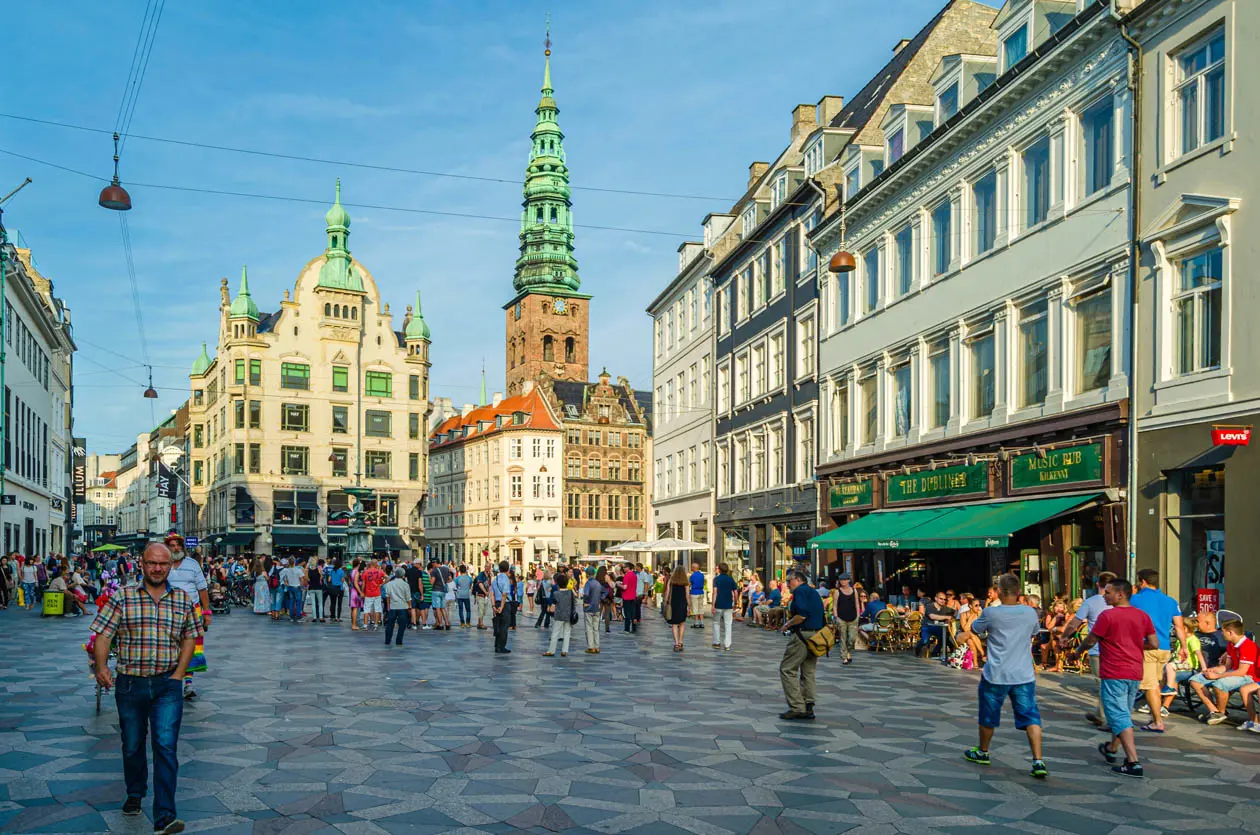
Strøget: the beating heart of Copenhagen
Strøget is one of Europe’s longest pedestrian streets and the epicenter of shopping in Copenhagen. Stretching for about one kilometer from City Hall Square (Rådhuspladsen) to the elegant Kongens Nytorv, the route weaves through Frederiksberggade, Nygade, Vimmelskaftet, and Østergade, passing historic squares like Nytorv, Gammeltorv, and Amagertorv.
A paradise for shoppers, Strøget offers everything from global fashion chains to luxury brands and Danish designer boutiques. It also holds rich cultural and architectural value - nearby are gems like the Church of Our Lady (city cathedral) and the Stork Fountain on Amagertorv, a lively spot often animated by street performers and musicians. At one end is the City Hall Tower, offering panoramic views; at the other, the grand Royal Danish Theatre on Kongens Nytorv.
Christianshavn district
Framed by canals and steeped in authenticity, Christianshavn is one of Copenhagen’s most atmospheric neighborhoods, a perfect glimpse into the city’s maritime and bohemian side. It retains its historic charm with Dutch-style houses, boats moored along scenic canals, and narrow cobbled streets.
Stroll along the main canal, enjoy cafés, bistros, and local markets, or embark on a traditional canal cruise, a romantic gondola ride, or a kayak adventure through the harbor and city waterways.
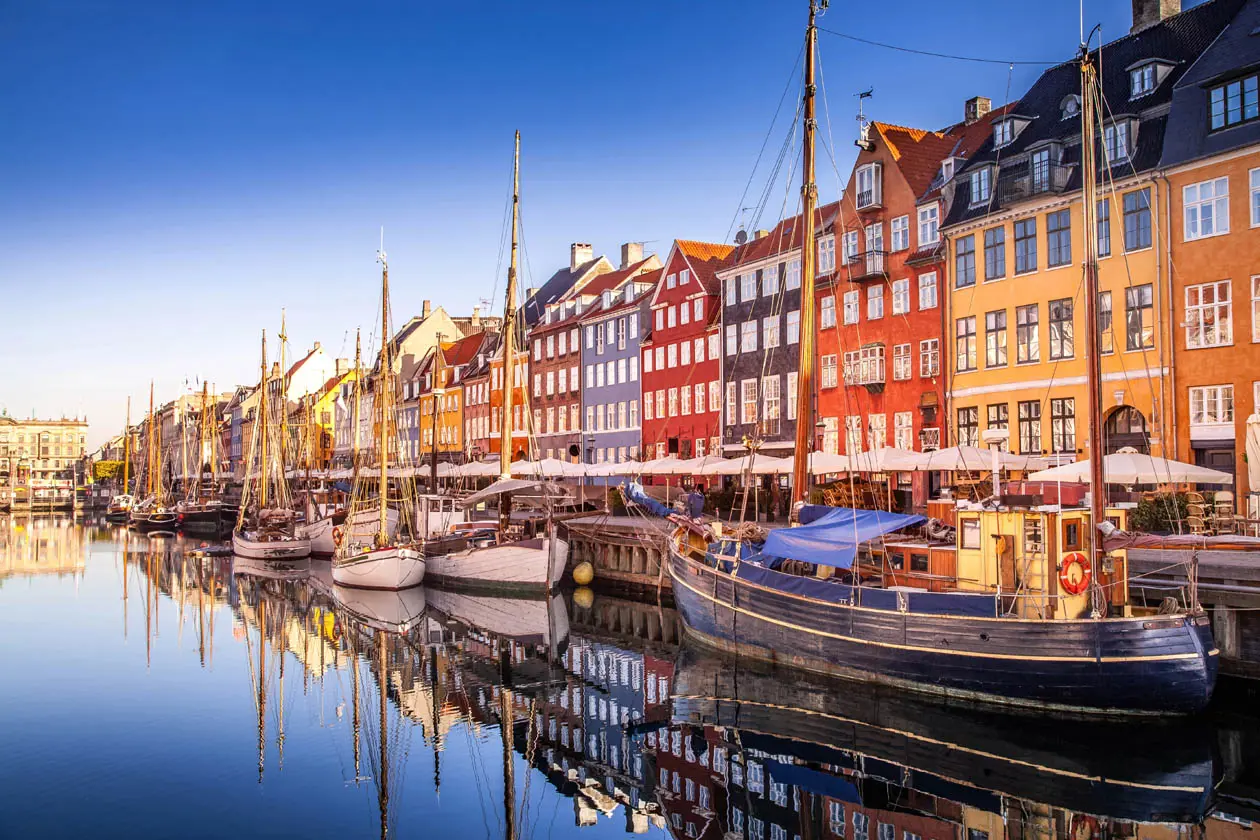
A haven for gourmets, Christianshavn is home to some of the best restaurants in Copenhagen, offering Nordic cuisine and classic smørrebrød with herring, seafood, eggs, or steak tartare. The area’s highlight is the Church of Our Saviour, known for its external spiral tower, which you can climb for panoramic views of the city.
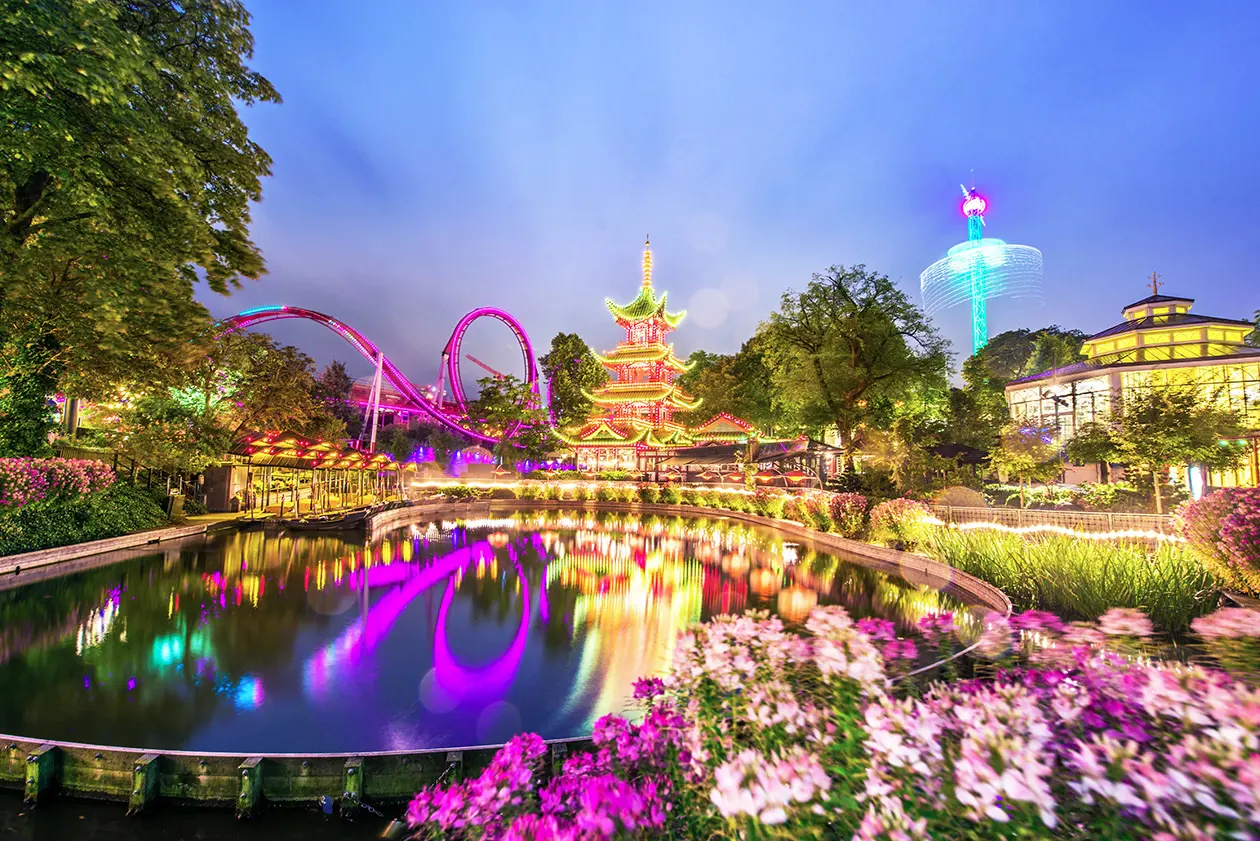
Tivoli Gardens
Right next to the Central Station and a short walk from City Hall, Tivoli Gardens is Copenhagen’s historic amusement park - founded in 1843 and said to have inspired both Hans Christian Andersen and Walt Disney. A beloved national treasure and international attraction, Tivoli blends rides, roller coasters (including a wooden one from 1914), haunted houses, and themed attractions with lush gardens and exotic architecture - lit by thousands of twinkling lights each evening.
You can picnic in the gardens or dine at one of the many restaurants - ranging from Danish traditional to French bistro or gourmet burgers. In addition to major events like Friday Rock and Summer Classics, there’s live music every day. Throughout the year, Tivoli transforms to match the seasons: in summer, it hosts open-air concerts; in autumn, it dresses up for Halloween with thousands of pumpkins; and in winter, it becomes a magical Christmas village filled with lights and festive markets.

 You're browsing offline! External links will become available when you're online
You're browsing offline! External links will become available when you're online
